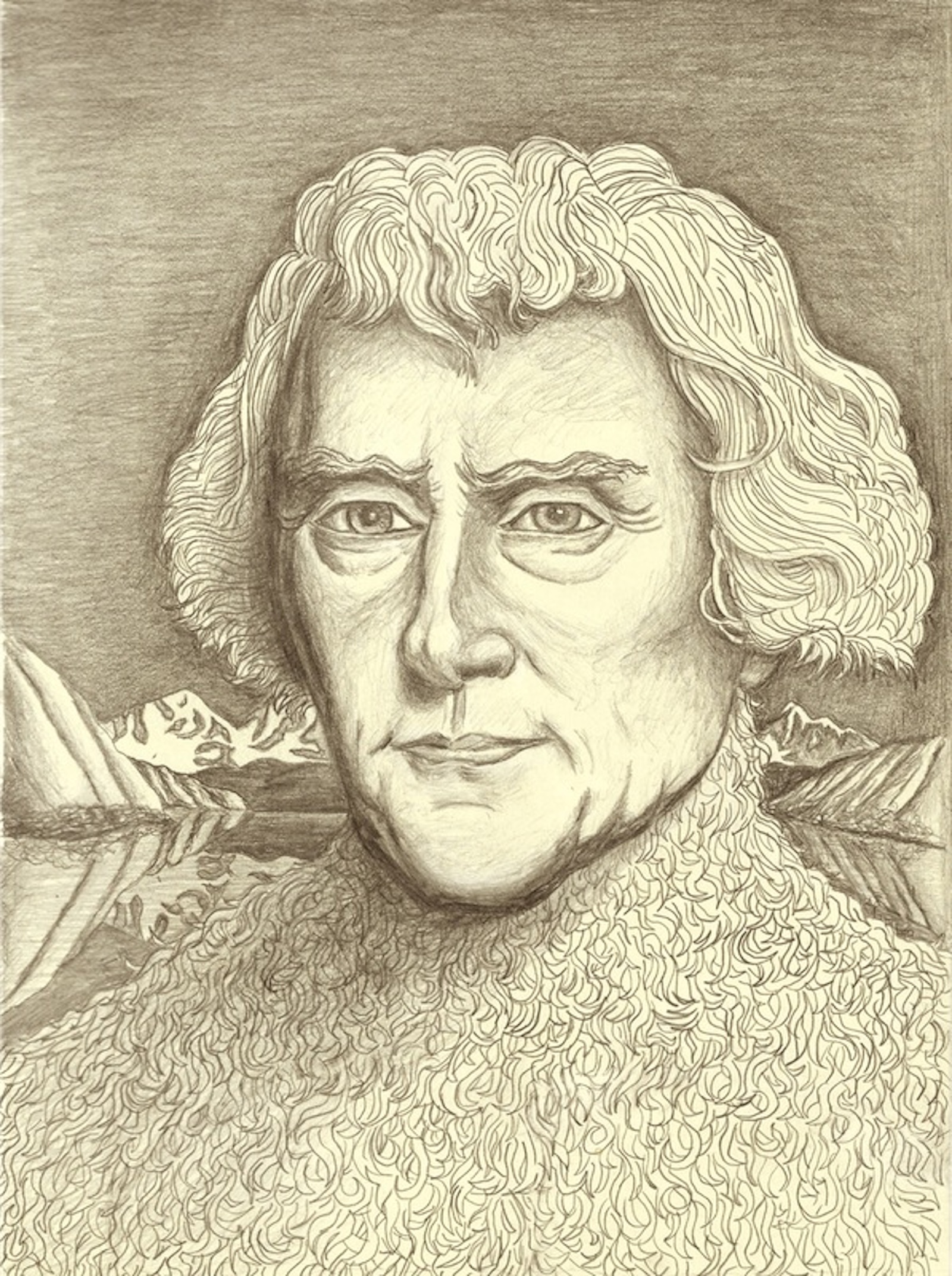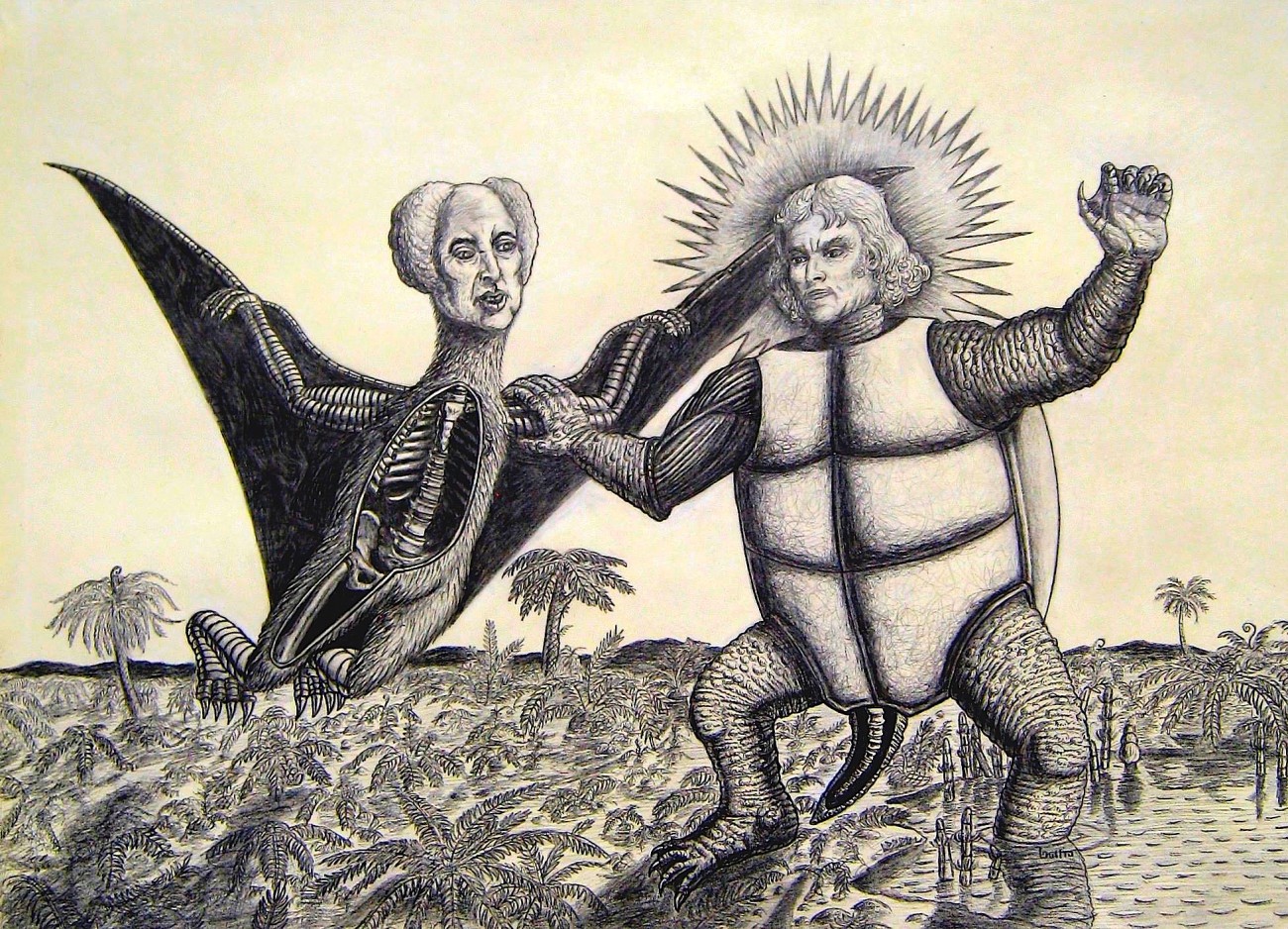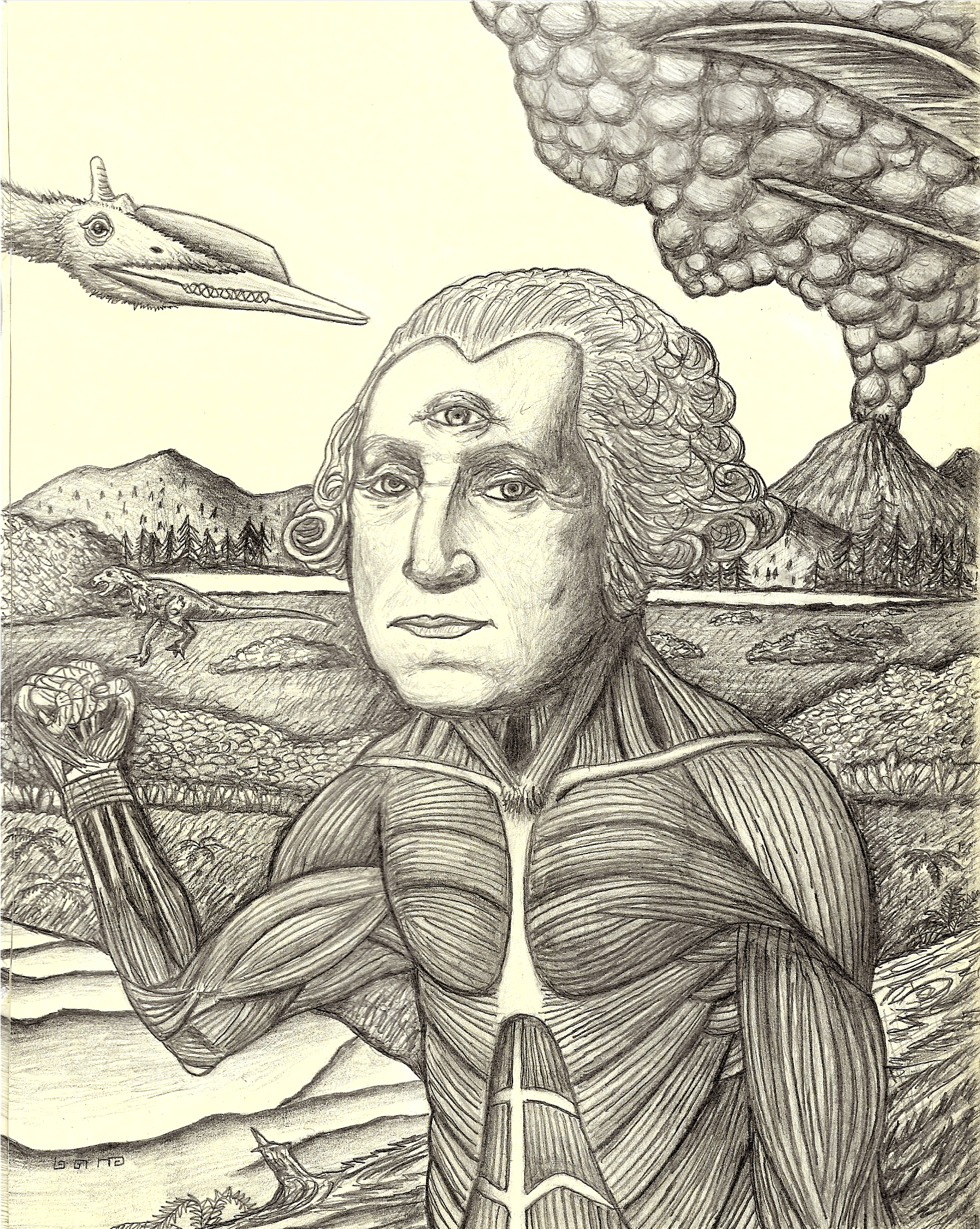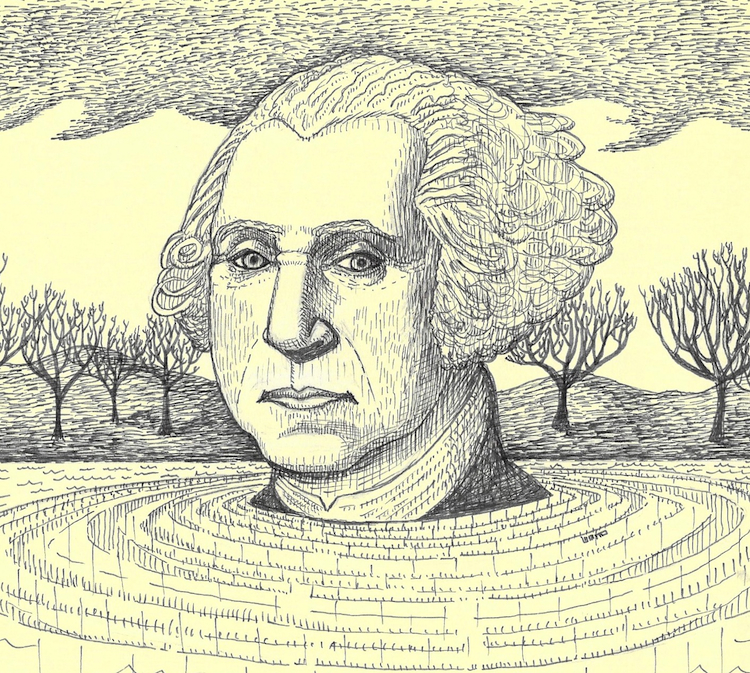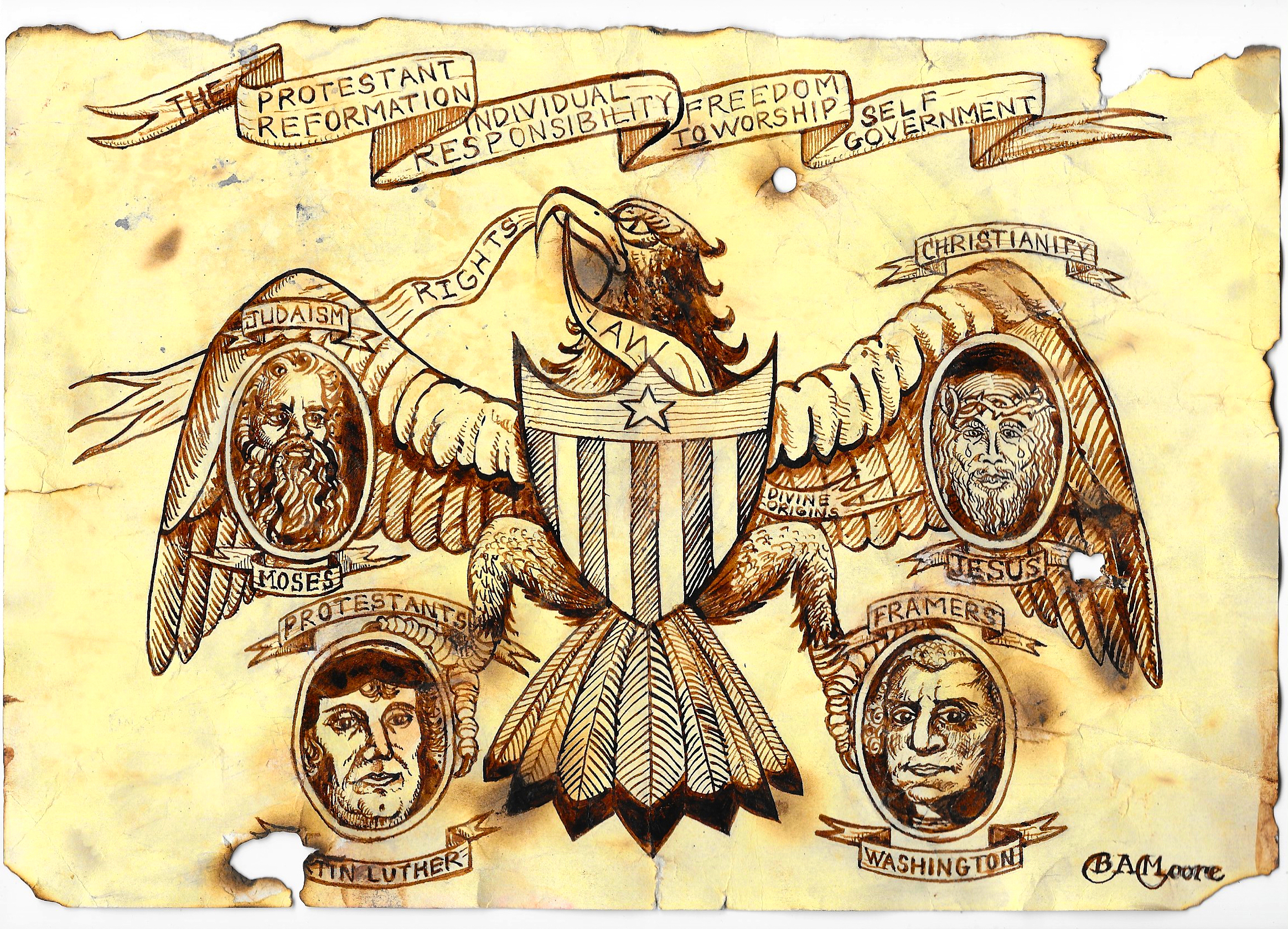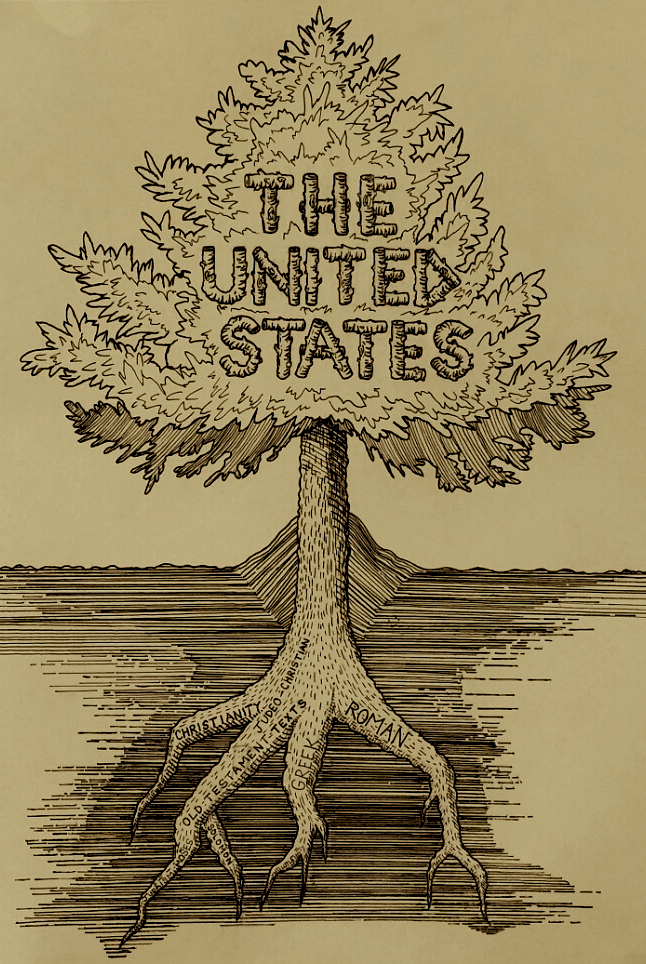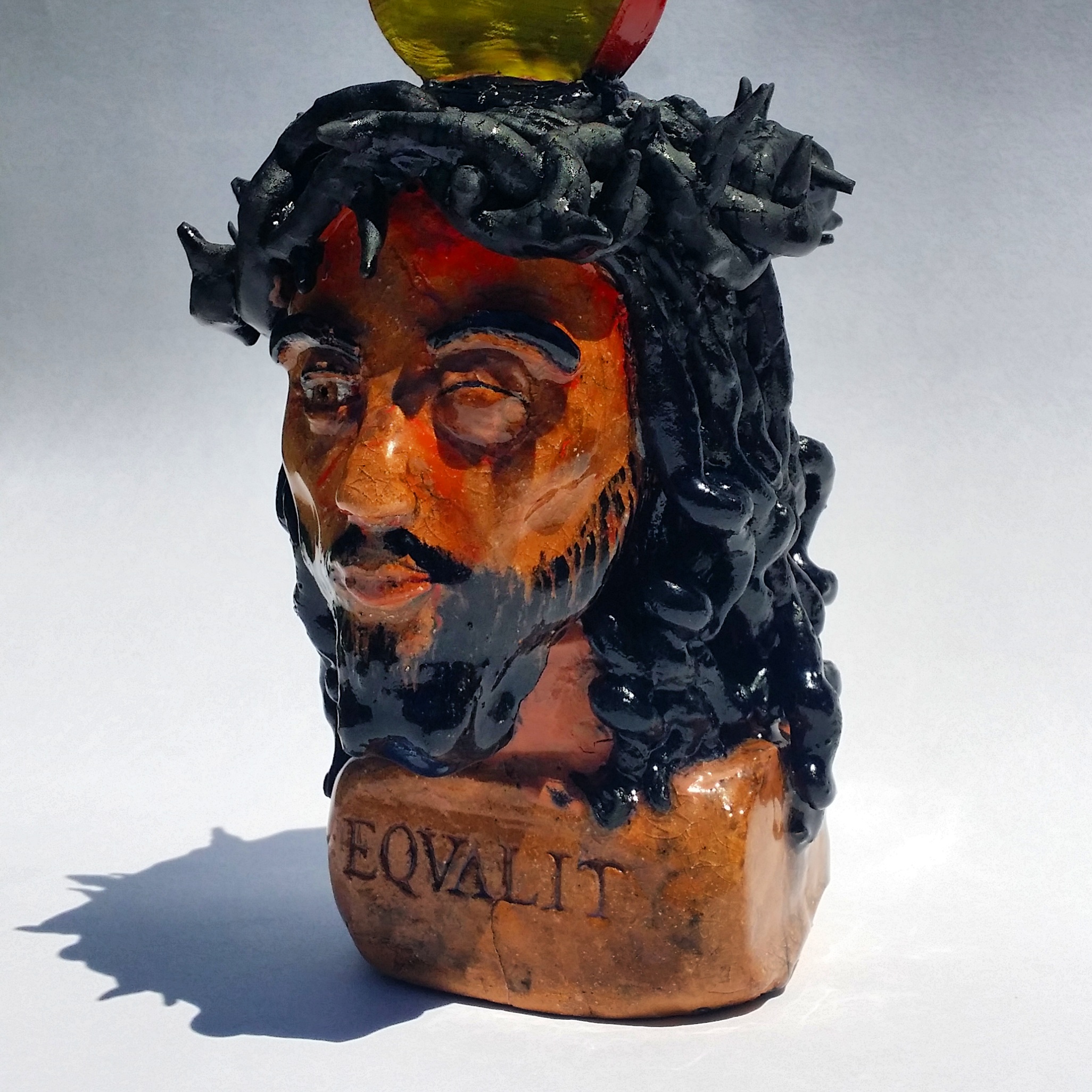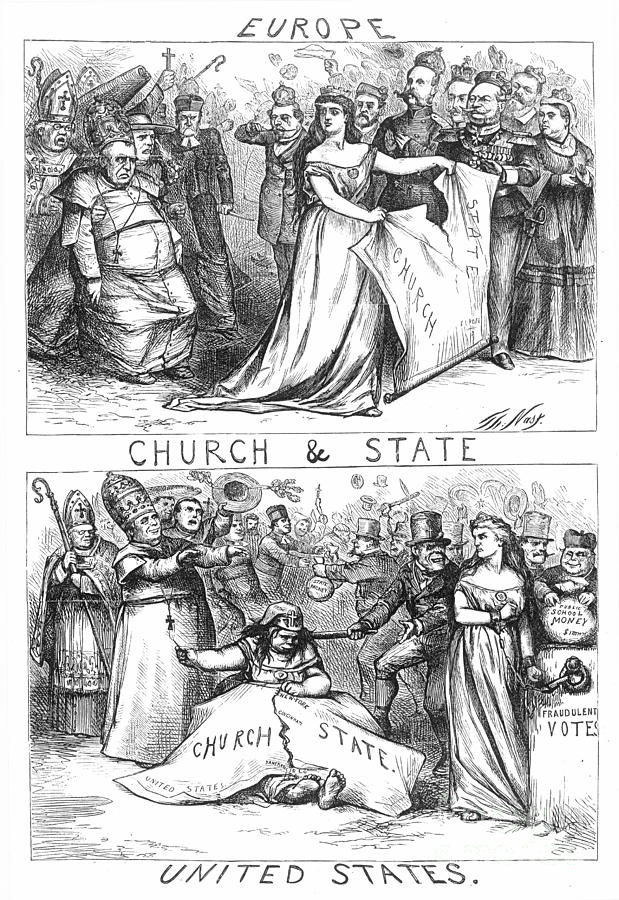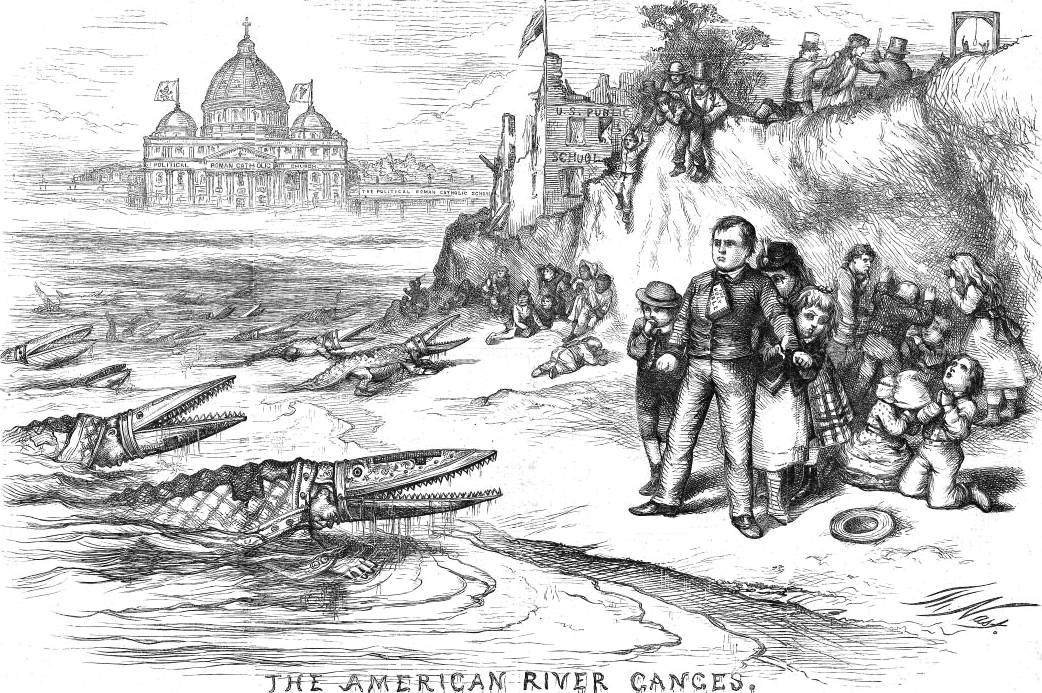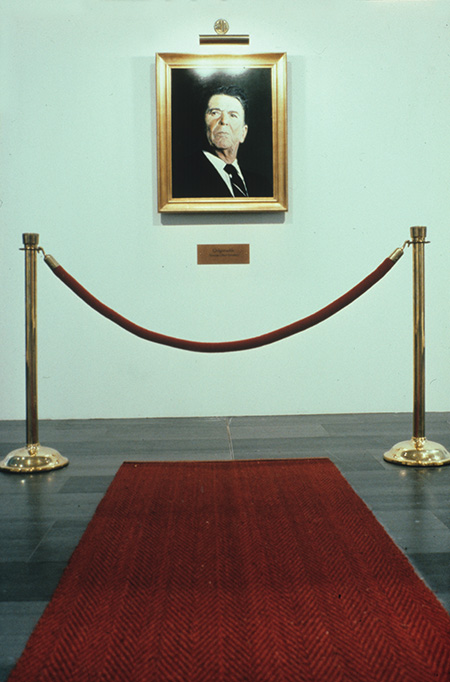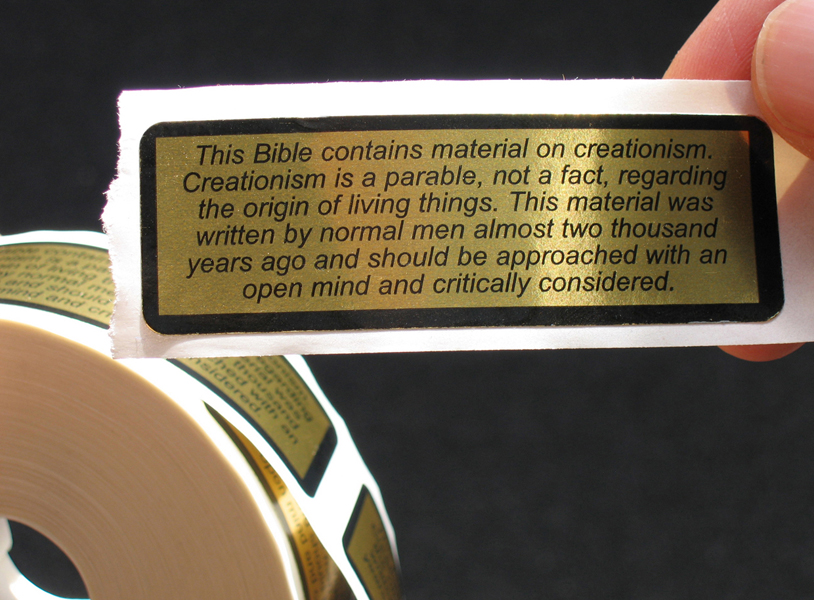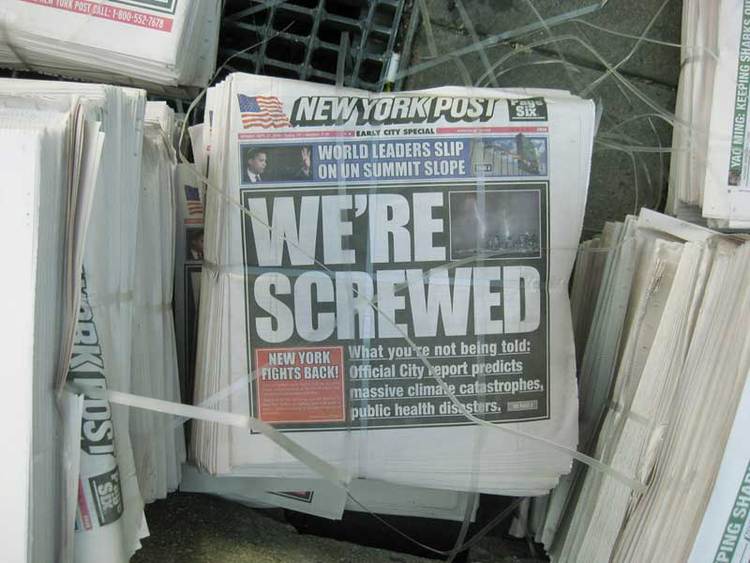Whoever controls the narrative controls history. This is a powerful message. Those who ignore it will remain blind to the manipulation of others, but those who get it, like the people of the American Revolution, will be able to challenge abusive authority and take control of their destinies.
— Ray Raphael
Introduction: National History Myth-story
United States history often deals with times so far removed from experience that they’ve become fabled times of legend, which various groups edit or mythologize at will.
Thomas Jefferson, in his personal library, classified the Bible as ancient history. However, he believed that the book had been altered and he thought that he was qualified to redact what he perceived as the inaccuracies. In Jefferson’s book, The Life and Morals of Jesus of Nazareth, he excised the miracles out of his Bible with a razor and pasted the non-miraculous passages into an order of his liking to create his personal version of history. In a similar manner, disparate groups are presently editing history to their liking, selectively adding quotes by esteemed personages to the conservative or liberal canon and omitting or deliberately obfuscating any contrary to their beliefs.
Among these groups are Tea Party Republicans, combining libertarian ideas on taxation with conservative Christian religious beliefs. As unlimited corporate campaign finance donations have led to national and state legislatures that are essentially filled with corporate sponsored government officials, wealthy individuals and corporations have gained an ever-increasing, disproportionate means to disperse their propaganda. From cradle to grave, conservative historical and religious propaganda is being thrust upon our citizens, disguised as objective historical or scientific fact.
The political system that we have in place is not working for the benefit of the majority, but rather for the benefit of the wealthy. As stated by author Matt Taibbi:
Although poverty rates largely declined during the 1990s, offering at least one possible explanation for the drop in violent crime, poverty rates rose sharply during the 2000s. At the start of that decade, poverty levels hovered just above 10 percent. By 2008 they were up to 13.2 percent. By 2009 the number was 14.3 percent. By 2010, 15.3 percent. All this squares with what most people who lived in Middle America knew, and know, instinctively. Despite what we’re being told about a post-2008 recovery, despite what the rising stock market seems to indicate, the economy is mostly worse, real incomes are mostly declining, and money is mostly scarcer.[1]
Through campaign contributions, lobbyists, and back-room deals, the wealthy employ all aspects of the state apparatus, including those of an ideological nature, in the furtherance of their rule. Louis Althusser described the nature of this employment in his essay “Ideology and Ideological State Apparatuses”:
What are the Ideological State Apparatuses (ISAs)? They must not be confused with the (Repressive) State Apparatus. In Marxist theory, the State Apparatus (SA) contains: the Government, the Administration, the Army, the Police, the Courts, the Prisons, etc. . . . the State Apparatus in question “functions by violence” . . . I shall call Ideological State Apparatuses a certain number of realities . . . in the form of distinct and specialized institutions. . . . : the religious ISA (the system of the different churches), the educational ISA (the system of the different public and private ‘schools’) [emphasis mine], . . . the communications ISA (press, radio and television, etc.), the cultural ISA (literature, the arts, sports, etc. . . . it is clear that whereas the unified – (Repressive) State Apparatus belongs entirely to the public domain, much the larger part of the Ideological State Apparatuses (in their apparent dispersion) are part, . . . of the private domain. . . . The distinction between the public and the private is a distinction internal to bourgeois law, . . . The domain of the State escapes it because the latter is “above the law”: the State, which is the State of the ruling class, is neither public nor private.[2]
Tellingly, in the United States, the distinctions between public and private have blurred even further than the merger described in Althusser’s essay. Prisons are now often private, corporations such as Halliburton and Blackwater/Academi have assumed many of the Army’s tasks, and police departments farm out traffic citations to private companies, etc. In other words, our republic is in the hands of the 1%. Although there are exceptions within this small group of wealthy individuals, for the most part, they subscribe to and promulgate a conservative ideology. This “free market” ideology portrays the ultra-wealthy as hard working, job creating, and benevolent geniuses.
Conservative ideology has infiltrated every facet of government power. My paper is concerned with the effects of this ideological influence on public education, particularly the resultant propagandistic history, which I call myth-story or mythstory. The substitution of knowledge with falsehoods supporting conservative, free-market ideology, rather than critical thought, is toxic to the functioning of a democratic system.
Using the Texas State Board of Education’s textbook manipulations[3] as a case study, this paper identifies, investigates and disputes the fictions that are being taught to our children through the machinations of the financial elite, and proposes democratic alternatives to partisan ideological indoctrination.
Notes
[1] Taibbi, Matt. (The Divide: American Injustice in the Age of the Wealth Gap. First Edition. New York: Spiegel & Grau, 2014), xv-xvi.
The consequences of this economic inequality are many. For instance, as Taibbi continues;
But throughout all this time, violent crime has gone down. It continues to decline today. Counterintuitively, more poverty has not created more crime. The third piece of information that makes no sense is that during this same period of time, the prison population in America has exploded. In 1991 there were about one million Americans behind bars. By 2012 the number was over2.2 million, a more than 100 percent increase. Our prison population, in fact, is now the biggest in the history of human civilization. There are more people in the United States either on parole or in jail today (around 6 million total) than there ever were at any time in Stalin’s gulags. For what it’s worth, there are also more black men in jail right now than there were in slavery at its peak. See if this syllogism works, then. Poverty goes up; Crime goes down; Prison population doubles.
[2] Althusser, Louis. On Ideology. Translated by Ben Brewster. London ; New York: Verso, 2008.
[3] The Texas State Board of Education approved the current textbook standards in 2010. The new textbooks that met those standard were approved in November of 2014.
Chapter 1: Fact, Fiction and Founding Faithers
Thomas Jeffersnowman, graphite on paper, Bryan Anthony Moore, 2013.
When the concerns came in, from multiple people, and that had weight too, we were trying to sort things out, said Thomas Nelson Senior Vice President and Publisher Brian Hampton. Were these matters of opinion? Were they differences of interpretation? But as we got into it, our conclusion was that the criticisms were correct. There were historical details — matters of fact, not matters of opinion, that were not supported at all.
— NPR, August 9th, 2012.
Critique of David Barton
Author’s such as David Barton, one of the “experts” that advised the Texas State Board of Education on it’s textbook standards, portray our nation’s Founders as political conservatives that drew their ideas from uncritical obeisance to biblical principles. If “Founders” is meant to refer to the entire generation that lived through the Revolutionary War years and is also inclusive of the latter period in which the Constitution was ratified, then the Founders would in reality, be a very diverse group including men of many religious sects and those that rejected organized religion completely. However, the most notable of these Founders (those that penned the Declaration of Independence, the Constitution, and served in the top tiers of leadership), were for the most part, liberal revolutionaries inspired by John Locke and the Baron Montesquieu. These Founders were men steeped in rational discourse and the questioning of authority that was so crucial to the Age of Reason.
Barton’s latest book, The Jefferson Lies, was pulled from publication by its conservative Christian publisher, Thomas Nelson, whose representative Brian Hampton, cited the lack of “basic truth” in the book as the reason for the publisher’s extremely rare decision to withdraw the book from the market:
“When the concerns came in, from multiple people, and that had weight too, we were trying to sort things out,” said Thomas Nelson Senior Vice President and Publisher Brian Hampton. “Were these matters of opinion? Were they differences of interpretation? But as we got into it, our conclusion was that the criticisms were correct. There were historical details — matters of fact, not matters of opinion, that were not supported at all.” The book has already been pulled off the Thomas Nelson website, and the publisher is in the process of pulling down its availability as an e-book from retail partners. Publishing rights are being reverted to the author, and the physical copies of the book are in the process of being removed from bookstores. “The truth is, the withdrawing of a book from the market is extremely rare. It’s so rare I can’t think of the last time we’ve done this,” Hampton said. But, he said, “If there are matters of fact not correctly handled or the basic truth is not there, we would make a decision based on that.”[4]
David Barton’s education consists of a Bachelor of Arts degree in religious education from Oral Roberts University. Through his appearances on Fox News, Barton is chief among the self styled historians serving fictional historical fare to the adult population even as he contributes to the downfall of historical texts for children. Though his book on Jefferson has been withdrawn by Thomas Nelson Publishing, he offers it for sale, along with his other works, from his personal website. Many libraries have already stocked the Thomas Nelson edition of the book. I had to request the book by being placed on a waiting list at my local public library due to high demand.
In The Jefferson Lies, with a foreword by Glenn Beck, David Barton sets out to “debunk” what he says are six “lies” about the life of Thomas Jefferson. These “lies” are not attributed to any specific sources and are often such an exaggerated version of what Barton claims are “liberal beliefs,” that they essentially serve as dominoes that Barton can then easily knock down, though he often resorts to misinformation to do so.
Among the chapters is one titled LIE #3 Thomas Jefferson Wrote His Own Bible and Edited Out the Things He Didn’t Agree With.[5] Here in the chapter title, as elsewhere in the chapter, Barton accuses those with views divergent from his own (though he doesn’t name those that hold these beliefs) of exaggerated beliefs that, indeed, in some cases are not true; Jefferson, of course, didn’t technically write his own Bible, he edited only the gospels of the New Testament and he titled the work The Life and Morals of Jesus of Nazareth, rather than the “Jefferson Bible” as it is colloquially called. However, Barton makes his argument with the mistaken assumption that any view on the subject of Jefferson’s faith consists of one of only two possible options: one being that Thomas Jefferson was a conservative Christian with beliefs that one would find orthodox in any mainstream protestant denomination today, with the only other possibility being that Jefferson was an Atheist that disliked Christianity, Jesus, and the Bible.
In doing so Barton completely ignores the Deist worldview that many Enlightenment era thinkers espoused. This precludes the possibility that Jefferson appreciated Jesus as the best example of moral doctrines he had found, yet thought that much that had been ascribed to him had been done so in error or to purposely corrupt his teachings. To understand that Jefferson was a Deist with very unorthodox beliefs, requires a subtlety of understanding that not all beliefs fall within a strict religious/atheist divide, meaning that beliefs reside on a continuum rather than existing in a strict dichotomy. An eighteenth century American’s individual’s beliefs could be Anglican, Christian Deist, Deist, Baptist or Atheist, among other possibilities.
Barton states that, “Logic would tell us that if Jefferson wrote his own Bible, he would do so only if he were thoroughly dissatisfied with the traditional Bible, especially its inclusion of the supernatural.”[6] I don’t quite understand Barton’s position that “logic” would impart the knowledge that supernatural elements of the Bible would “especially” be the reason for Jefferson’s undertaking, but as Jefferson stated, “things impossible . . . superstitions” were a significant factor in his editing of the gospels. In a letter to William Short dated 4, August 1820, Jefferson wrote:
We find in the writings of [Jesus’] biographers matter of two distinct descriptions. First a groundwork of vulgar ignorance, of things impossible, of superstitions, fanaticisms and fabrications [emphasis mine]. Intermixed with these again, are sublime ideas of the Supreme Being, aphorisms, and precepts of the purest morality and benevolence, sanctioned by a life of humility, innocence and simplicity of manners, neglect of riches, absence of worldly ambition and honors, with an eloquence and persuasiveness which have not been surpassed. These could not be the intentions of the groveling authors [the authors of the gospels] who related them. They are far beyond the powers of their feeble minds. They show there was a character, a subject of their history, whose splendid conceptions were above suspicions being interpolations from their hands. Can we be at a loss in separating such materials and ascribing each to its original author? The difference is obvious to the eye and to the understanding, and we may read as we run to each his part; and I will venture to affirm that he who, as I have done, will undertake to winnow this grain from the chaff, will find it not to require a moment’s consideration. The parts fall asunder of themselves, as would those of an image of metal and clay.[7]
In The Jefferson Lies, Barton claims that, “There is no ‘Jefferson Bible,’ and Jefferson did not produce any work for the purpose of deleting the miraculous and supernatural.”[8]
Though Jefferson’s work is informally referred to by that title, it is technically debatable whether or not there is a “Jefferson Bible,” as even Jefferson did not call his book by that name – but Barton’s assertion that Jefferson “did not produce any work for the purpose of deleting the miraculous and supernatural,” is completely false. The aforementioned letter to William Short makes it readily evident that Jefferson believed the writers of the gospels had corrupted the gospels, had possessed “feeble minds” and had added “a groundwork of vulgar ignorance, of things impossible, of superstitions, fanaticisms and fabrications” to the story of Jesus’ life.
Lest we should be unclear of Jefferson’s opinion on the veracity of the Bible as a whole, or of the Gospels which he edited, we can read what he wrote to William Short on the matter, in his cover letter to the work dated April 13, 1820 (please note that I have left archaic spellings intact as they are easily decipherable):
This Syllabus is meant to place the character of Jesus in it’s true and high light, as no imposter himself, but a great Reformer of the Hebrew code of religion, it is not to be understood that I am with him in all his doctrines. . . . Among the sayings & discourses imputed to him by his biographers, I find many passages of fine imagination, correct morality, and of the most lovely benevolence: and others again of so much ignorance, so much absurdity, so much untruth; charlatanism, and imposture, as to pronounce it impossible that such contradictions should have proceeded from the same being.
I separate therefore the gold from the dross; restore to him the former, & leave the latter to the stupidity of some, and roguery of others of his disciples. . . . I read them as I do those of other antient and modern moralists, with a mixture of approbation and dissent [emphasis mine].[9]
Critique of Larry Schweikart and Michael Allen
David Barton is far from being alone in his publication of pseudo-historical “facts” tailored to conservative religious propaganda. On page 71 of A Patriot’s History of the United States, a book written by conservative authors Larry Schweikart and Michael Allen and titled as a rebuke to Howard Zinn’s A People’s History of the United States, the authors state:
It goes without saying, that most of these men were steeped in the traditions and teachings of Christianity—almost half the signers of the Declaration of Independence had some form of seminary training or degree. John Adams, certainly and somewhat derogatorily viewed by his contemporaries as the most pious of the early Revolutionaries [emphasis mine], claimed that the Revolution “connected, in one indissoluble bond, the principles of civil government with the principles of Christianity.”[10]
In reading the above quote regarding John Adams and his fellow “Founders”, we again encounter this inference that the Christianity of the founders was a monolith rather than a big tent that could and did accommodate Episcopalians, Quakers, Catholics, Christian Deists and Unitarians. If we are to take the description of Adams “as the most pious of the early Revolutionaries,” as a mark of his religiosity, then we must conclude from the letters he exchanged with Jefferson that his was a “religiosity” inclined to question the accuracy of The Ten Commandments, the Gospels, and the rest of the contents of the Bible. We can read this in the following excerpt from a letter to Jefferson, dated November 14, 1813, which I quote at length (please note that I have left the archaic spellings and grammar intact as they are of the period at issue and easily decipherable):
Have you ever met a book, the design of which is to prove, that the Ten Commandments, as We have them in our Catechisms and hung up in our Churches, were not the Ten Commandments written by the Finger of God upon tables, delivered to Moses on Mount Sinai and broken by him in a passion with Aaron for his golden calf, nor those afterwards engraved by him on Tables of Stone; but a very different Set of Commandments? There is such a book by J. W. Goethens Schristen. Berlin 1775–1779. I wish to See this Book. You will See the Subject and perceive the question in Exodus 20. 1–17 . . . &c.
I will make a Covenant with all this People. Observe that which I command this day.
1 Thou Shall not adore any other God. Therefore take heed, not to enter into covenant, with the Inhabitants of this country; neither take for your Sons, their daughters in marriage. They would allure thee to the Worship of false Gods. Much less Shall you in any place, erect Images.
2 The Feast of unleavened bread, Shall thou keep. Seven days, Shall thou eat unleavened bread, at the time of the month Abib; to remember that about that time, I delivered thee from Egypt.
3 Every first born of the mother is mine; the male of thine herd, be it Stock or flock. But you Shall replace the first born of an Ass with a Sheep. The first born of your Sons Shall you redeem. No Man Shall appear before me with empty hands.
4 Six days Shall thou labour: the Seventh day, thou shall rest from ploughing and gathering.
5 The Feast of Weeks shalt thou keep, with the firstlings of the wheat Harvest: and the Feast of Harvesting, at the end of the year.
6 Thrice, in every year, all male persons shall appear before the Lord. Nobody shall invade your Country, as long as you obey this Command.
7 Thou shall not Sacrifice the blood of a Sacrifice of mine, upon leavened bread.
8 The Sacrifice of the Passover Shall not remain, till the next day.
9 The Firstlings of the produce of your land, thou Shalt bring to the House of the Lord.
10 Thou shalt not boil the kid, while it is yet Sucking.
And the Lord Spake to Moses: Write these Words; as, after these Words I made with you, and with Israel a Covenant.
I know not whether Goethens translated or abridged from the Hebrew, or whether he used any translation Greek, Latin, or German. But he differs in form and Words, Somewhat from our Version. Exod. 34. 10. to 28. The Sense Seems to be the Same. The Tables were the evidence of the covenant, by which the Almighty attached the People of Israel to himself. By these laws they were Seperated from all other nations, and were reminded of the principal Epochas of their History. When and where originated our Ten commandments? The Tables and The Ark were lost. Authentic copies, in few, if any hands; the ten Precepts could not be observed, and were little remembered. If the Book of Deuteronomy was compiled, during or after the Babilonian Captivity, from Traditions, the Error or amendment might come in there . . . I admire your Employment, in Selecting the Philosophy and Divinity of Jesus and Seperating it from all intermixtures. If I had Eyes and Nerves, I would go through both Testaments and mark all that I understand.[11]
Clearly John Adams took a critical view toward the contents of the Bible and many of the teachings of mainstream Christianity, such as the complete infallibility of the Bible, questioning the origin and the accuracy of even the Ten Commandments, which Texas’ textbooks would have students believe, were inspirational to the Founders in drafting our Constitution and in founding our nation.
John Adams
Adams vs. Jefferson, graphite on paper, Bryan Anthony Moore, 2013.
In the following letter, Adams gives a description of the nature of his faith and his rebuke of Calvinist Christians and believers in the Athanasian Divines (meaning the Holy Trinity), which between them would include all Protestant and Catholic denominations extant in the United States both in Adams’ era and ours. On September 14, 1818, John Adams writes:
God has infinite wisdom, goodness, and power; he created the universe; his duration is eternal, a parte ante and a parte post. His presence is as extensive as space. What is space? An infinite spherical vacuum. He created this speck of dirt and the human species for his glory; and with the deliberate design of making nine tenths of our species miserable for ever for his glory. This is the doctrine of Christian theologians, in general, ten to one.
In the above statement, Adams criticizes the mainstream Christian theology of his contemporaries. He continues:
Now, my friend, can prophecies or miracles convince you or me that infinite benevolence, wisdom, and power, created, and preserves for a time, innumerable millions, to make them miserable for ever, for his own glory? Wretch! What is his glory? Is he ambitious? Does he want promotion? Is he vain, tickled with adulation, exulting and triumphing in his power and the sweetness of his vengeance? Pardon me, my Maker, for these awful questions. My answer to them is always ready. I believe no such things. My adoration of the author of the universe is too profound and too sincere. The love of God and his creation — delight, joy, triumph, exultation in my own existence — though but an atom, a molecule organ-ique in the universe — are my religion.
Howl, snarl, bite, ye Calvinistic, ye Athanasian divines, if you will; ye will say I am no Christian; I say ye are no Christians, and there the account is balanced. Yet I believe all the honest men among you are Christians, in my sense of the word.[12]
Note that “Athanasian divines” refers to those Christians that believe in the concept of the Holy Trinity, considered a central belief of any orthodox or “mainstream” interpretation of Christianity. The “religion” of John Adams did not conform to the conservative Christian worldview of the 18th century, nor does it align with that of the 21st. His beliefs are those, rather, of a Christian Deist, they are extremely heterodox when compared to any conservative definition of Christianity.
But what advantage do authors such as David Barton or Larry Schweikart think that their cause gains by depicting the Founders as Christians with beliefs mirroring those of contemporary conservatives? Could it be the furtherance of an authority/follower mindset? An unquestioning belief in the Bible and the belief in the interconnectedness of religious and civil authorities (church and state) are useful tools in the continuation of the status quo by those in power. These traits are in diametric opposition to those that the revolutionary nature of Enlightenment thought espoused.
In the Deist belief system that was shared by many of the influential founders, questioning and even rejecting authority was encouraged, while science and reason were embraced. Darren Staloff describes Deism thusly:
Deism or “the religion of nature” was a form of rational theology that emerged among “freethinking” Europeans in the 17th and 18th centuries. Deists insisted that religious truth should be subject to the authority of human reason rather than divine revelation. Consequently, they denied that the Bible was the revealed word of God and rejected scripture as a source of religious doctrine. As devotees of natural religion, they rejected all the supernatural elements of Christianity. Miracles, prophecies, and divine portents were all proscribed as residues of superstition, as was the providential view of human history. The doctrines of original sin, the account of creation found in Genesis, and the divinity and resurrection of Christ were similarly castigated as irrational beliefs unworthy of an enlightened age. For Deists God was a benevolent, if distant, creator whose revelation was nature and human reason. Applying reason to nature taught most deists that God organized the world to promote human happiness and our greatest religious duty was to further that end by the practice of morality.[13]
Believing in the unerring authority of religious leaders and religious texts, along with a belief in a God that has predestined you to your appointed place in this world, are very useful tools to control not only religious unrest, but civil unrest as well, especially when you are taught that there is no separation between the religious and the civil authority. By playing into an authoritarian mindset, these beliefs encourage followers to unquestioningly follow. As much as rationalism, whether expressed through Atheism, Deism or any other worldview, rejects such beliefs, it endangers the unquestioned continuation of the current political situation by empowering individuals to take charge of their own destiny. Of course, Deism is not alone in this emancipated mindset, Atheism, and many other belief systems also afford their adherents such freedom of thought. But Deism or Unitarianism was the belief system of many of the prominent founders, and as such, is the belief system that religious conservatives (and those in power that find their beliefs useful) try to argue out of the historical record.
Ethan Allen
“Founding Father” Ethan Allen wrote in Reason: The Only Oracle of Man:
Such people as can be prevailed upon to believe, that their reason is depraved, may easily be led by the nose, and duped into superstition at the pleasure of those, in whom they confide, and there remain from generation to generation; for when they throw away the law of reason, the only one which God gave them to direct them in their speculations and duty, they are exposed to ignorant or insidious teachers, and also to their own irregular passions, and to the folly and enthusiasm of those about them, which nothing but reason can prevent or restrain; nor is it a rational supposition that the commonality of mankind would ever have mistrusted, that their reason was depraved, had they not been told so, and it is whispered about, that the first insinuation of it was from the Priests.[14]
Known for his capture of Fort Ticonderoga and Benedict Arnold, Allen can be counted as one of the most publicly outspoken Deists among the founders.
Benjamin Franklin
The Abominable Statesman, graphite on paper, Bryan Anthony Moore, 2013.
Benjamin Franklin, a self avowed Deist, wrote the following letter to Harvard President Ezra Stiles, shortly before his impending death in 1790:
You desire to know something of my Religion. It is the first time I have been questioned upon it: But I do not take your Curiosity amiss, and shall endeavour in a few Words to gratify it. Here is my Creed: I believe in one God, Creator of the Universe. That He governs it by his Providence. That he ought to be worshipped. That the most acceptable Service we can render to him, is doing Good to his other Children. That the Soul of Man is immortal, and will be treated with Justice in another Life respecting its Conduct in this. These I take to be the fundamental Principles of all sound Religion, and I regard them as you do, in whatever Sect I meet with them. As to Jesus of Nazareth, my Opinion of whom you particularly desire, I think the System of Morals and his Religion as he left them to us, the best the World ever saw, or is likely to see; but I apprehend it has received various corrupting Changes, and I have with most of the present Dissenters in England, some Doubts as to his Divinity: tho’ it is a Question I do not dogmatise upon, having never studied it, and think it needless to busy myself with it now, when I expect soon an Opportunity of knowing the Truth with less Trouble [emphasis mine].[15]
In Franklin’s Autobiography, he describes the beliefs he acquired as a young man:
Before I enter upon my public appearance in business, it may be well to let you know the then state of my mind with regard to my principles and morals, that you may see how far those influenced the future events of my life. My parents had early given me religious impressions, and brought me through my childhood piously in the Dissenting way. But I was scarce fifteen when after doubting, by turns, of several points as I found them disputed in the different books I read, I began to doubt of Revelation itself. Some books against Deism fell into my hands; they were said to be the substance of sermons preached at Boyle’s Lectures. It happened that they wrought an effect on me quite contrary to what was intended by them; for the arguments of the Deists, which were quoted to be refuted, appeared to me much stronger than the refutations; in short, I soon became a thorough Deist [emphasis mine].[16]
Thomas Paine
Thomas Paine, known as The Father of the American Revolution, was a pamphleteer whose booklet, Common Sense, ignited the American public in the run up to the American Revolution. He went on to become a figure of significance in the French Revolution though he was later alienated from the American public due to his criticisms of George Washington.
Thomas Paine said of Christianity:
The study of theology, as it stands in the Christian churches, is the study of nothing; it is founded on nothing; it rests on no principles; it produces no authorities; it has no data; it can demonstrate nothing; and it admits of no conclusion” and “The only religion that has not been invented, and that has in it every evidence of divine originality, is pure and simple Deism.[17]
And as simple government avoids us becoming the dupes of fraud, so simple belief protects us from the fraud of priestcraft, which so often runs hand in hand with despotism.[18]
James Madison
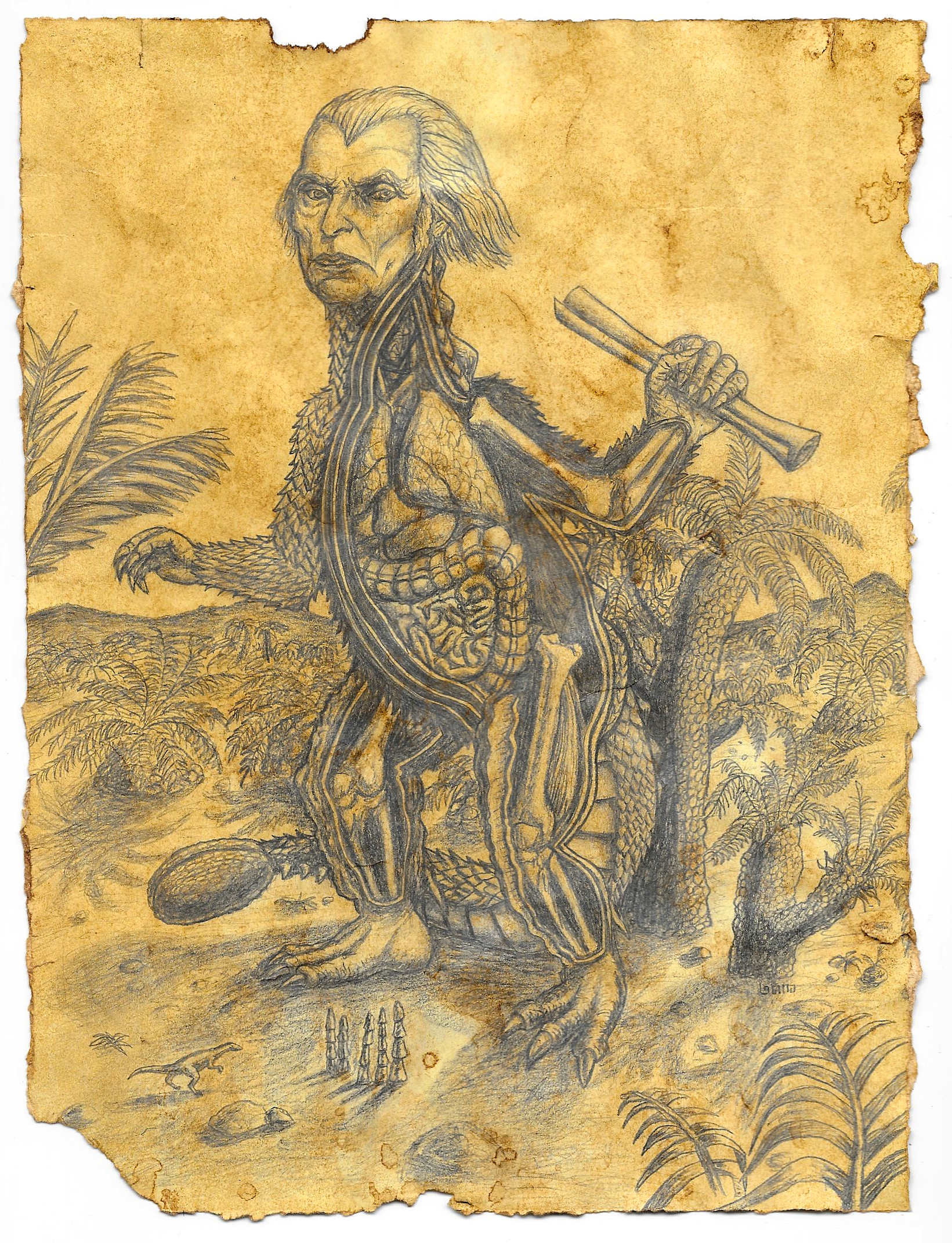 Madison’s Constitution, graphite on coffee stained paper, Bryan Anthony Moore, 2013.
Madison’s Constitution, graphite on coffee stained paper, Bryan Anthony Moore, 2013.
James Madison, the principal author of the Constitution, wrote in a letter to William Bradford, dated April 1, 1774:
Religious bondage shackles and debilitates the mind and unfits it for every noble enterprize [sic], every expanded prospect.[19]
In the letter, A Memorial and Remonstrance, addressed to the General Assembly of the Commonwealth of Virginia, Madison wrote:
Experience witnesseth that ecclesiastical establishments, instead of maintaining the purity and efficacy of Religion, have had a contrary operation. During almost fifteen centuries has the legal establishment of Christianity been on trial. What have been its fruits? More or less in all places, pride and indolence in the Clergy, ignorance and servility in the laity, in both, superstition, bigotry and persecution. Enquire of the Teachers of Christianity for the ages in which it appeared in its greatest lustre; those of every sect, point to the ages prior to its incorporation with Civil policy. Propose a restoration of this primitive State in which its Teachers depended on the voluntary rewards of their flocks, many of them predict its downfall. On which Side ought their testimony to have greatest weight, when for or when against their interest?[20]
In the paragraph above, Madison argues that in other nations, the legal establishment of Christianity as a national religion had led to ignorance, servility, bigotry and persecution. He also points out that Christian clergy claiming their faith needs state subsidies for continued existence are not so much making a case for their church, as an argument against it, as a truly beneficial institution should be able to survive on voluntary donations. Later in the letter, Madison summarizes his views in a scathing critique of “ecclesiastical establishments” (state religions):
What influence in fact have ecclesiastical establishments had on Civil Society? In some instances they have been seen to erect a spiritual tyranny on the ruins of the Civil authority; in many instances they have been seen upholding the thrones of political tyranny: in no instance have they been seen the guardians of the liberties of the people. Rulers who wished to subvert the public liberty, may have found an established Clergy convenient auxiliaries. A just Government instituted to secure & perpetuate it needs them not [emphasis mine]. Such a Government will be best supported by protecting every Citizen in the enjoyment of his Religion with the same equal hand which protects his person and his property; by neither invading the equal rights of any Sect, nor suffering any Sect to invade those of another.[21]
Clearly, Madison saw the mixture of church and state, as a threat to the very liberties that the Revolution had been fought to ensure.
James Monroe
James Monroe was mentored by and remained a lifelong friend to the Christian Deist Thomas Jefferson. Monroe also secured Thomas Paine’s release from a French prison and housed Paine in his family residence while Paine was writing his anti-Christian, pro-rational, Deist tract, The Age of Reason, in which Paine argued that the Bible was not divinely inspired and that it was the work of men that were intent on remaining in power. In fact, Paine used a Bible borrowed from the Monroes for reference while writing The Age of Reason. James Monroe, like many of the Founders, was also a Freemason, an organization with strong Deist tendencies.
As the above material demonstrates again and again, the principal authors of both the Declaration of Independence and the Constitution fully endorsed a complete separation of church and state, and the beliefs of the Founding Fathers were much more nuanced, varied and critical than Barton et al would have us believe.
The Treaty of Tripoli
There were Giants in the Earth, graphite on paper, Bryan Anthony Moore, 2013.
The Treaty of Tripoli is perhaps the most comprehensively damning document for the view that the Founders created a nation based on Christianity. The treaty points out the intention of the first two U.S. Presidents and the early Senate; that the United States ought not to be thought of as a nation founded on the “Christian Religion”. The Treaty of Peace and Friendship between the United States and the Bey and Subjects of Tripoli of Barbary was begun under George Washington’s presidency. It was submitted to the Senate by President John Adams, and received unanimous ratification from the U.S. Senate. It became law on June 10th. 1797.
From Article 11 of the Treaty:
As the government of the United States of America is not in any sense founded on the Christian Religion [emphasis mine], – as it has in itself no character of enmity against the laws, religion or tranquility of Musselmen, – and as the said States never have entered into any war or act of hostility against any Mehomitan nation, it is declared by the parties that no pretext arising from religious opinions shall ever produce an interruption of the harmony existing between the two countries.[22]
This sentiment seems especially timely in the context of our current military involvement in multiple Middle Eastern nations.
The Founders
Washington Crossing the Delaware, ink on paper, Bryan Anthony Moore, 2013.
Which Founders do conservatives refer to when they categorize “The Founders” as Christians? Perhaps they refer to the signers of The Declaration of Independence or the Framers of the Constitution. Of the handful of Founders that the average American can name, Jefferson, Adams and Franklin are demonstrably Deists. Madison and Monroe expressed strongly Deist beliefs as well as being proponents of the complete separation of church and state. Washington’s religious beliefs cannot be definitively proven, though he did not believe in taking communion (a supernatural rite), and he used Deistic or Masonic language when discussing “God”, referring to the deity as “Providence” or “The Grand Architect”. Alexander Hamilton was a long time opponent of organized religion, though on his painful, post-duel deathbed, he did ask for communion.[23]
Jefferson variously referred to Jesus’ teachings as the “most perfect” and as “flawed”. John Adams, like Jefferson, considered himself a Christian Deist or Rational Christian. As such, Adams criticized Paine for his unbridled criticisms of Christianity. Though Paine was a Deist, he was not a Christian Deist like Adams. These men were free thinkers, none perhaps believing exactly alike but all feeling empowered to question the very veracity of the Bible or even of religions themselves. There was no monolithic set of beliefs among Deists just as there was no monolith of beliefs among all sects of Christians, and there were shades of thought between the two systems. To try and pigeon-hole the Founders as devout Christians, one must, in order to be honest, admit that these were “Christians” that often rejected the divinity of Christ, the existence of the Trinity, the infallibility of the Bible, revelation, communion, miracles, immaculate conception, etc. For contemporary Christian conservatives to categorize the founders as Christians, and in doing so, associate the founders’ beliefs with those of contemporary religious conservatives, is a wantonly fallacious act.
In attempting to portray the nation’s founding as a conservative Christian enterprise and in attempting to cast doubt on the separation of church and state while violating that separation by introducing religious belief as “fact” in our public school texts, the Tea Party, along with its allies and corporate sponsors (a coalition I call “Founding Faithers”), is seeking to portray conservative Christian churches as a national institution. In the words of Thomas Paine “All national institutions of churches, whether Jewish, Christian or Turkish, appear to me no other than human inventions, set up to terrify and enslave mankind, and monopolize power and profit.”[24]
Thomas Jeffersnowman, graphite on tea stained paper, Bryan Anthony Moore, 2013.
Notes
[4] “Publisher Pulls Controversial Thomas Jefferson Book, Citing Loss Of Confidence.” NPR.org. Accessed February 24, 2015. http://www.npr.org/blogs/thetwo-way/2012/08/09/158510648/publisher-pulls-controversial-thomas-jefferson-book-citing-loss-of-confidence.
[5] Barton, David, and Glenn Beck. The Jefferson Lies: Exposing the Myths You’ve Always Believed About Thomas Jefferson. Book Club. Nashville: Thomas Nelson, 2012.
[6] Barton and Beck, “Thomas Jefferson Wrote His Own Bible and Edited Out the Things He Didn’t Agree With”, 67.
[7] “Founders Online: From Thomas Jefferson to William Short, 4 August 1820.” Accessed January 11, 2015. http://founders.archives.gov/documents/Jefferson/98-01-02-1438.
[8] Barton and Beck, “Thomas Jefferson Wrote His Own Bible and Edited Out the Things He Didn’t Agree With”, 67.
[9] Founders Online: From Thomas Jefferson to William Short, 13 April 1820.” Accessed January 11, 2015. http://founders.archives.gov/documents/Jefferson/98-01-02-1218. The full quote is as follows:
But while this Syllabus is meant to place the character of Jesus in it’s true and high light, as no imposter himself, but a great Reformer of the Hebrew code of religion, it is not to be understood that I am with him in all his doctrines. I am a Materialist; he takes the side of spiritualism: he preaches the efficacy of repentance towards forgiveness of sin, I require a counterpoise of good works to redeem it Etc. Etc. it is the innocence of his character, the purity & sublimity of his moral precepts, the eloquence of his inculcations, the beauty of the apologues in which he conveys them, that I so much admire; sometimes indeed needing indulgence to Eastern hyperbolism. My eulogies too may be founded on a postulate which all may not be ready to grant. Among the sayings & discourses imputed to him by his biographers, I find many passages of fine imagination, correct morality, and of the most lovely benevolence: and others again of so much ignorance, so much absurdity, so much untruth; charlatanism, and imposture, as to pronounce it impossible that such contradictions should have proceeded from the same being. I separate therefore the gold from the dross; restore to him the former, & leave the latter to the stupidity of some, and roguery of others of his disciples. Of this band of dupes and impostors, Paul was the great Coryphaeus, and first corrupter of the doctrines of Jesus. These palpable interpolations and falsifications of his doctrines led me to try to sift them apart. I found the work obvious and easy, and that his part composed the most beautiful morsel of morality which has been given to us by man. The Syllabus is therefore of his doctrines, not all of mine. I read them as I do those of other antient and modern moralists, with a mixture of approbation and dissent.
[10] Michael Allen and Larry Schweikart, A Patriot’s History of the United States,
(New York: Penguin, 2004), 71.
[11] “Founders Online: John Adams to Thomas Jefferson, 14 November 1813.” Accessed October 25, 2014. http://founders.archives.gov/documents/Jefferson/03-06-02-0476.
[12] John Adams to Thomas Jefferson, September 14, 1818, in The Founding Faith Archive, http://www.beliefnet.com/resourcelib/docs/73/Letter_from_John_Admas_to_Thomas_Jefferson_1p.html.
[13] Staloff, Darren. “Deism and the Founding of the United States.” Divining America, TeacherServe©. National Humanities Center. April 26, 2015. <http://nationalhumanitiescenter.org/tserve/eighteen/ekeyinfo/deism.htm>
[14] Allen, Ethan. Reason, The Only Oracle of Man Or a Compendius System of Natural Religion, 2011. http://www.gutenberg.org/ebooks/37694.
[15] Franklin, Benjamin, William Temple Franklin, and William Duane. Memoirs of Benjamin Franklin. (Derby & Jackson, 1859) 623.
[16] Franklin, Benjamin, William Temple Franklin, and William Duane. Memoirs of Benjamin Franklin. (Derby & Jackson, 1859), 23-24.
[17] Nicolson, Harold. The Age of Reason (1700-1789). (Indo-European Publishing, 1962), 167-168.
[18] Philp, Mark. “Thomas Paine.” In The Stanford Encyclopedia of Philosophy, edited by Edward N. Zalta, Winter 2013., 2013. http://plato.stanford.edu/archives/win2013/entries/paine/.
[19] Gaustad, Edwin S. Faith of Our Fathers: Religion and the New Nation. 1 edition. (San Francisco: Harpercollins, 1987), 37.
[20] Founders Online: Memorial and Remonstrance against Religious Assessments, [ca. ….” Accessed January 10, 2015. http://founders.archives.gov/documents/Madison/01-08-02-0163.
[21] Founders Online: Memorial and Remonstrance against Religious Assessments, [ca. ….” Accessed January 10, 2015. http://founders.archives.gov/documents/Madison/01-08-02-0163.
[22] Treaty of Peace and Friendship between the United States and the Bey and Subjects of Tripoli of Barbary.” Wikisource. Accessed January 11, 2015. http://en.wikisource.org/wiki/Treaty_of_Tripoli.
[23] Rossano, Matt J. “Alexander Hamilton’s Religion: A Temperate Example For Today’s Fractured World.” Huffington Post, 1–3, 2011. http://www.huffingtonpost.com/matt-j-rossano/hamiltons-religion_b_803677.html.
[24] Paine, Thomas. The Age of Reason, Etc, (1839), 2.
Chapter 2: Case Study – Texas Tea and Textbooks
Inaccuracies in conservative propaganda reach back to the biblical period and through the present regarding climate change and other issues. Within the scope of this paper and my project, I have chosen to address the misinformation that concerns our nation’s “Founding Fathers” of the Revolutionary War period, as it is so central to our national identity.
The state of Texas provides a recent example of this politically motivated indoctrination process. On November twenty-first of 2014, the Texas Department of Education approved new public school textbooks. A list detailing some of the inaccuracies found in these texts, broken into sections by specific book and publisher, as compiled by The Texas Freedom Network, is included below: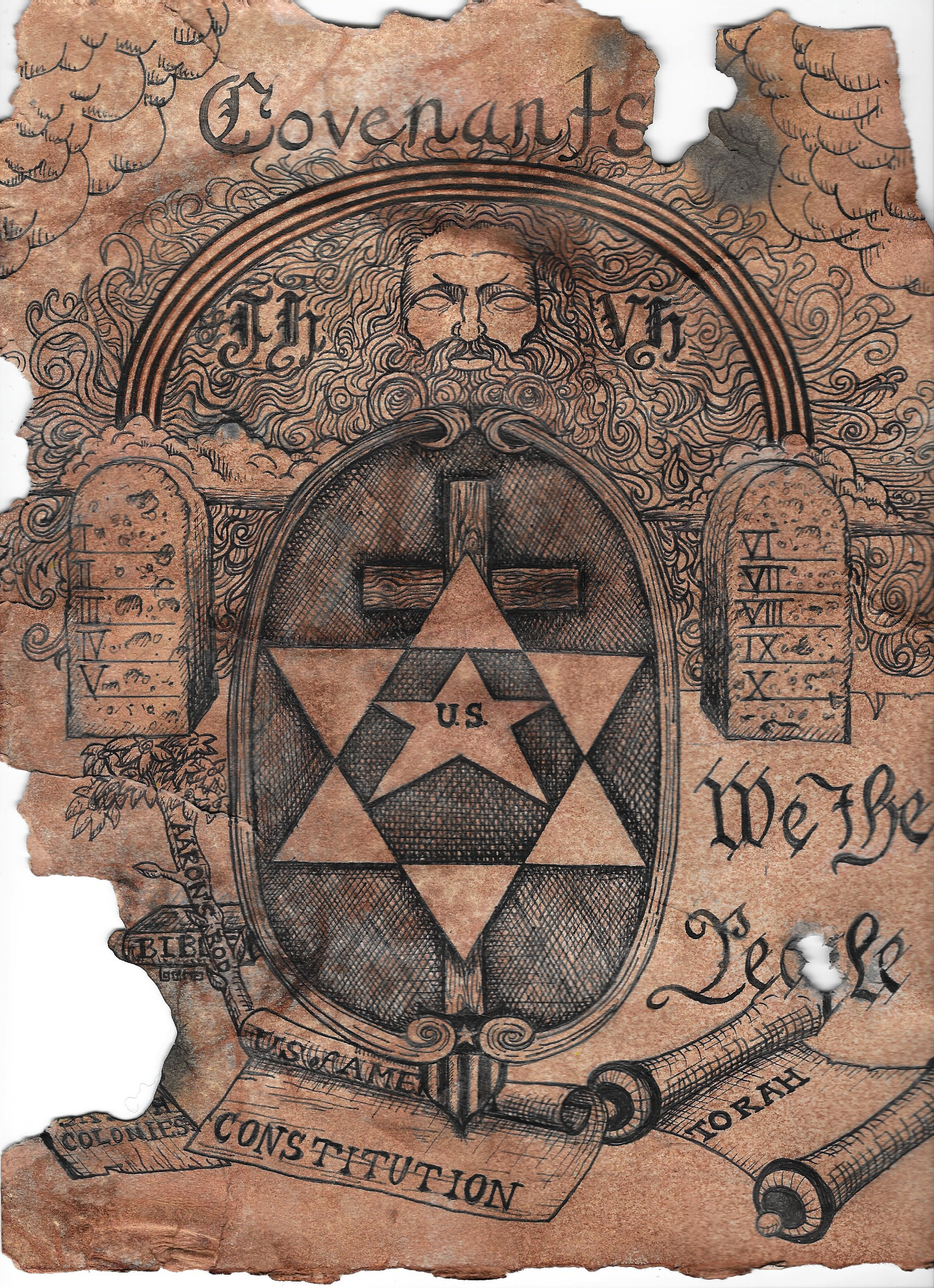
McGraw-Hill School Education – United States Government
“The biblical idea of a covenant, an ancient Jewish term meaning a special kind of agreement between the people and God, influenced the formation of colonial governments and contributed to our constitutional structure.”
The American Founders did believe in a social contract, but their version of that contract was derived primarily from modern British political thought, and John Locke’s thought in particular. Since Locke’s version of the social contract was in many ways a repudiation of the biblical covenant view referenced in this passage, this passage provides the student with almost the opposite of the historical truth.[25]
Contrast the above quote about the idea of a “biblical covenant” influencing our constitutional structure with what Jefferson wrote on the subject, in this excerpt of his letter to Samuel Kercheval:
Some men look at constitutions with sanctimonious reverence, and deem them like the arc of the covenant, [emphasis mine] too sacred to be touched. They ascribe to the men of the preceding age a wisdom more than human, and suppose what they did to be beyond amendment. I knew that age well; I belonged to it, and labored with it. It deserved well of its country. It was very like the present, but without the experience of the present; and forty years of experience in government is worth a century of book-reading; and this they would say themselves, were they to rise from the dead. I am certainly not an advocate for frequent and untried changes in laws and constitutions. I think moderate imperfections had better be borne with; because, when once known, we accommodate ourselves to them, and find practical means of correcting their ill effects. But I know also, that laws and institutions must go hand in hand with the progress of the human mind. As that becomes more developed, more enlightened, as new discoveries are made, new truths disclosed, and manners and opinions change with the change of circumstances, institutions must advance also, and keep pace with the times. We might as well require a man to wear still the coat which fitted him when a boy, as civilized society to remain ever under the regimen of their barbarous ancestors [emphasis mine].[26]
Jefferson contrasts the container bearing our secular laws (the Constitution) with the container that bore the religious laws of the Old Testament. The Arc of the Covenant was said to contain the two Tablets of Law, which were inscribed with the Ten Commandments. Jefferson argues that unlike the idea of biblical covenants, the secular laws of the United States were designed to “be touched,” and evolve with changing times and circumstances.
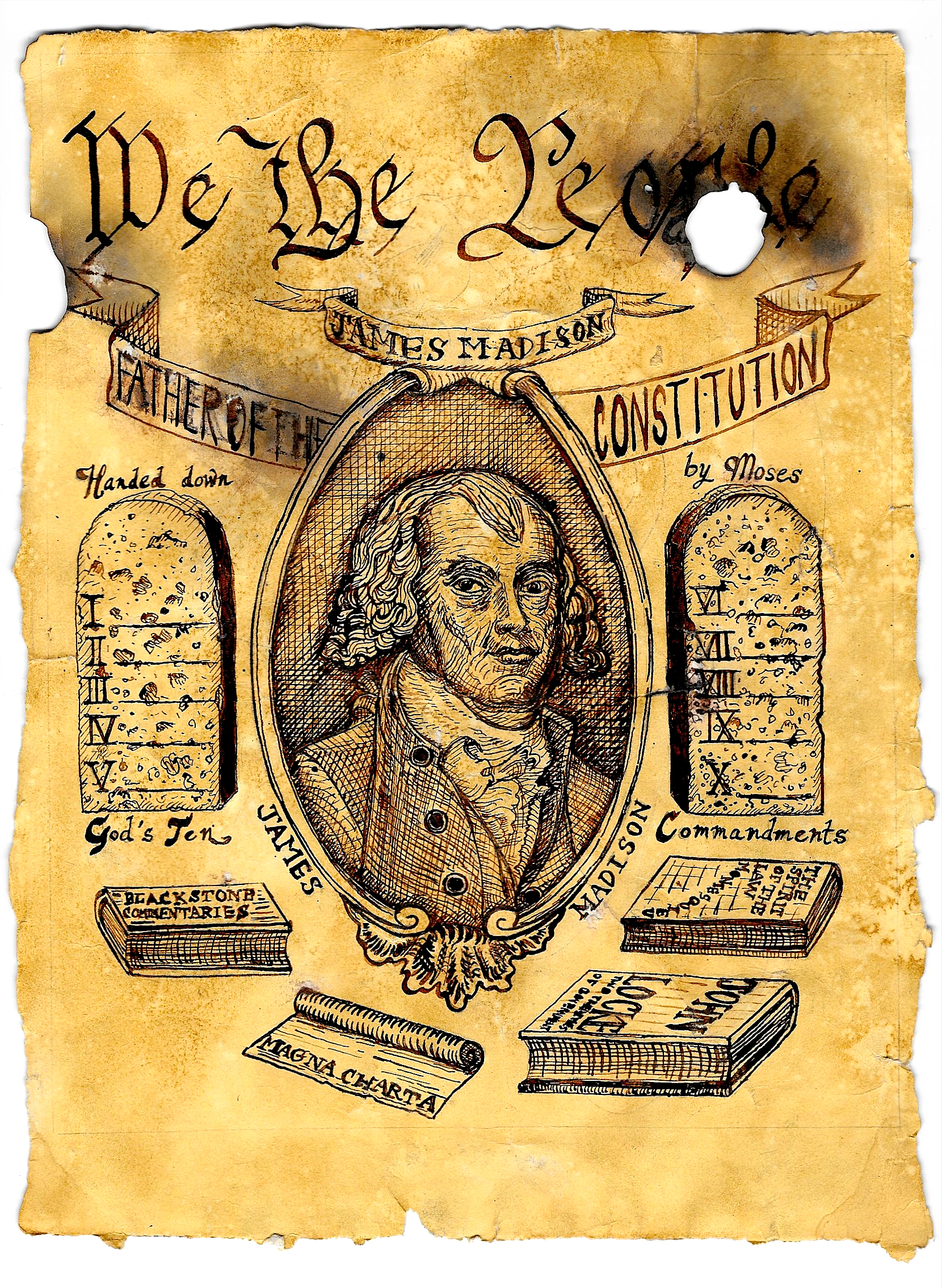 Where Did the Founders get their Ideas, quill and bullshit ink on tea and coffee stained paper, Bryan Anthony Moore, 2014. Illustration of Perfection Learning text “Where Did the Founders Get Their Ideas?” for Basic Principles of American Government.
Where Did the Founders get their Ideas, quill and bullshit ink on tea and coffee stained paper, Bryan Anthony Moore, 2014. Illustration of Perfection Learning text “Where Did the Founders Get Their Ideas?” for Basic Principles of American Government.
Perfection Learning – Basic Principles of American Government
Text has a table entitled “Where did the Founders get their ideas?” The introductory section to the table states: “When the Framers set out to write the Constitution, they drew upon the wisdom of philosophers, historians and economists. Here are a few of the people whose words influenced the content of that remarkable document.” Moses is listed first on this list, followed by John Locke, Charles de Montesquieu, and William Blackstone. The “concept” Moses is alleged to have contributed is that “A nation needs a written code of behavior.” The description of Moses includes the following sentences: “During their years of wandering in the desert of the Sinai, Moses handed down God’s Ten Commandments to the Hebrews. These commandments now form the bedrock on which the Jewish, Muslim, and Christian codes of behavior are based. The full account of Moses’ life can be found in the Bible’s book of Exodus.”
Unlike the contributions of the three other figures mentioned in the table, the contribution of Moses is highly nebulous and contestable. The passage neglects to mention which types of codified behaviors influenced the Framers, and thus makes it difficult to evaluate this claim. The Framers, for instance, were not influenced by the first four Commandments, which deal with matters of religious belief and practice. In fact, notable framers such as James Madison led the battle against government punishment for unorthodox religious belief. Further, stating that “Moses handed down God’s Ten Commandments” is very close to endorsing a religious claim. Stating, for instance, that “Jews and Christians believe that Moses handed down God’s Ten Commandments” would have been more acceptable. Without this qualification, the text seems to endorse the truth of these biblical claims [emphasis mine].[27]
This statement, “Moses handed down God’s Ten Commandments”, in a public school textbook is a complete violation of the First Amendment of the Constitution. Not only is it stating that Moses was a real historical figure, which is no small leap, but it’s also stating that there is a God and he is the G-d of the Judeo-Christian traditions. In this instance, the assertion that Moses as a law-giver, was highly influential to the Framers of our Constitution, is the least of the transgressions. The text continues; “During their years of wandering in the desert of the Sinai, Moses handed down God’s Ten Commandments to the Hebrews. These commandments now form the bedrock on which the Jewish, Muslim, and Christian codes of behavior are based. The full account of Moses’ life can be found in the Bible’s book of Exodus.” thereby endorsing the biblical book of Exodus as an authentic historical narrative. Notice only the “Bible’s book of Exodus” is recommended, if the publishers weren’t unconstitutionally endorsing a specific religion, along with the factual existence of both the Christian God and Moses, then why couldn’t a student look at the book of Exodus in a Torah as well as a Bible?
Houghton Mifflin Harcourt claims Judeo-Christian beliefs were the origin of the Founders’ thoughts on freedom of worship, self-government, and individual responsibility:
Judeo-Christian Influences, quill and bullshit ink on tea stained paper, Bryan Anthony Moore, 2014. Illustration of Houghton Mifflin Harcourt text ““The Framers’ political thinking was influenced by a Judeo-Christian religious heritage, which includes traditions common to both Judaism and Christianity. . . .” for United States Government: Principles in Practice
Houghton Mifflin Harcourt – United States Government: Principles in Practice
Text has a section on “Judeo-Christian Influences” that reads: “The Framers’ political thinking was influenced by a Judeo-Christian religious heritage, which includes traditions common to both Judaism and Christianity. These religions see the law and individual rights as being of divine origin. Moreover, the Framers benefited from the Protestant Reformation, a sixteenth-century Christian reform movement whose leaders developed ideas about individual responsibility, the freedom to worship as one chooses, and self-government.”
This passage gives no example of a law or set of laws in the Bible that influenced the Founders and no example of a Founder or a founding document that was influenced by the “Judeo-Christian” concept of law. The text’s claim that the Reformation was a source of the Founders’ views on individual responsibility omits several important pieces of information. Major figures in the Protestant Reformation such as Martin Luther and John Calvin may have supported freedom of worship for their own views, but they often did not support freedom of worship for many competing religious views. Similarly, the views of major Reformation figures, including Luther and Calvin, about self-government were far more limited than, and had little in common with, the views of the American Founders about self-government.
Finally, the paragraph could leave students with a misleading impression about the Founders’ religious views. The passage’s claim that Judaism and Christianity stresses that individual rights are of “divine origin” and that these views influenced all of the Founders suggests that all of the Founders believed that this biblical God was the source of natural rights. Many Founders did, of course, believe in the biblical God. Other Founders, though, were influenced by Deism, and their conception of God departed in significant ways from the biblical God.[28]
Some of the Founders may have had strong religious convictions that informed their political beliefs. However, others strongly believed that the inspiration for individual rights and freedoms had come from English laws that had origins in continental Europe, and that were inherited from Pagan Anglo-Saxon migrants, or from the Greek and Pre-Christian Roman democracies. Some of the Founders even implied that it was the Christian Norman invaders that first wrested these liberties from their ancient English forebears. In a letter to Major John Cartwright, dated June 5th, 1824, Jefferson wrote:
A perpetual claim was kept up by the nation [England] by their perpetual demand of a restoration of their Saxon laws; which shews they were never relinquished by the will of the nation. In the pullings and haulings for these antient rights between the nation and it’s kings of the races of Plantagenets, Tudors & Stuarts, there was sometimes gain, and sometimes loss, until the final reconquest of their rights from the Stuarts [emphasis mine]. The destitution and expulsion of this race broke the thread of pretended inheritance, extinguished all regal usurpations, and the nation re-entered into all it’s rights; and altho’ in their bill of rights they specifically reclaimed some only, yet the omission of the others was no renunciation of the right to assume their exercise also, whenever occasions should occur the new king received no rights or powers but those expressly granted to him. It has ever appeared to me that the difference between the whig and tory of England is, that the whig deduces his rights from the A-Saxon source, and the tory from the Norman. . . . I was glad to find in your book a formal contradiction, at length, of the judiciary usurpation of legislative powers; for such the judges have usurped in their repeated decisions, that Christianity is a part of the common law. The proof of the contrary, which you have adduced, is incontrovertible; to wit, that the common law existed while the Anglo-Saxons were yet Pagans, at a time when they had never yet heard the name of Christ pronounced, or knew that such a character had ever existed [emphasis mine].[29]
Jefferson clearly thought that the Bill of Rights had Anglo-Saxon precedents from England’s own myth-story; precedents that had merely re-surfaced in 1215, when Englishmen achieved, as Jefferson states in the letter above, “the final reconquest of their rights from the Stuarts.” This “reconquest” refers to the signing of the Magna Charta, an incredibly important document in the development of Western democracies. But Pearson Education’s textbook, quoted below, emphasizes the influence of the Ten Commandments, a short list of religious do’s and don’ts, rather than that of the Magna Carta, which provided for church rights, protection from unlawful imprisonment, a speedy trial by a jury of one’s peers, reasonable punishment for trivial crimes, protection of property, limited taxes, and other rights and protections to citizens.[30]
Pearson Education – Magruder’s American Government
Text includes a “Biography of Moses,” which states: “Moses was a lawgiver and a great leader. Like the founders of the United States, he helped establish a legal system to govern his people. The Ten Commandments have been a guide and basis for many legal and moral systems throughout the world [emphasis mine].” The annotation to the biography states: “Moses helped establish a legal system, including the Ten Commandments, to govern his people. Similarly, the founders of the United States wrote the Constitution and established a system of laws to govern Americans. They were also part of a tradition that was familiar with the Ten Commandments as a guide for moral behavior.”
The passage gives an exaggerated impression to students about the influence of and relationship between Moses and the Founders. The legal system that Moses founded had theocratic elements, which made it very different from the republican system of law the Founders established. Similarly, the text neglects to mention that the Founders were reacting against several of the crucial elements of the moral, legal, and political tradition associated with Moses and the Ten Commandments.[31]
John Adams wrote his opinions on the origins of American and English political thought in A Defence of the Constitutions of Government of the United States of America. Contrast these opinions in the excerpt below, with Pearson Education’s claim (above) of a biblical basis:
The Teutonic institutions, described by Cæsar and Tacitus, are the most memorable experiment merely political, ever yet made in human affairs. They have spread all over Europe, and have lasted eighteen hundred years. They afford the strongest argument that can be imagined in support of the point aimed at in these letters. Nothing ought to have more weight with America, to determine her judgment against mixing the authority of the one, the few, and the many, confusedly in one assembly, than the wide-spread miseries and final slavery of almost all mankind, in consequence of such an ignorant policy in the ancient Germans. What is the ingredient which in England has preserved the democratical authority? The balance, and that only. The English have, in reality, blended together the feudal institutions with those of the Greeks and Romans; and out of all have made that noble composition, which avoids the inconveniences, and retains the advantages, of both. The institutions now made in America will never wear wholly out for thousands of years: it is of the last importance then that they should begin right; if they set out wrong, they will never be able to return, unless it be by accident, to the right path. After having known the history of Europe, and of England in particular, it would be the height of folly to go back to the institutions of Woden and of Thor, as they are advised to do: if they had been counselled to adopt a simple monarchy at once, it would have been less mysterious. Robertson, Hume, and Gibbon have given such admirable accounts of the feudal institutions, and their consequences, that it would have been more discreet to have referred to them, perhaps, without saying any thing more upon the subject. To collect together the legislation of the Indians, would take up much room, but would be well worth the pains. The sovereignty is in the nation, it is true, but the three powers are strong in every tribe; and their royal and aristocratical dignities are much more generally hereditary, from the popular partiality to particular families, and the superstitious opinion that such are favourites of the God of War, than the late writers upon this subject have allowed.[32]
In the above quote, Adams cites Teutonic (Germanic), Roman, and Greek institutions of governance as the fonts from which the best of English political ideas (and by extension Anglo-American ideas) had sprang. He goes on to infer that American Indians (probably referring to the Iroquois Confederacy), had made some important contributions to American political thought. His reference to the three powers probably refers to a judicial, legislative and executive branch, but may be in reference to their formation of a bicameral legislature with a third “house” (the Onondaga tribe) acting much like an executive branch in breaking ties and possessing the power of veto.[33] Of course, Adams, ever the aristocrat, made sure to mention how valuable the hereditary component of the Iroquois polity was (though that was a misrepresentation). The Ten Commandments are conspicuously absent in both the liberal Jefferson’s, and conservative Adams’ descriptions of our political roots.
This textbook then goes on to claim that the roots of our democracy can be found in the Old Testament monarchy of Solomon in addition to the theocratic leadership of Moses:
The Roots of Democracy, ink on tea stained paper, Bryan Anthony Moore, 2015. Illustration for Pearson Education’s – Magruder’s American Government text: “The roots of democratic government in today’s world – including government in the United States – lie deep in human history. They reach back most particularly to ancient Greece and Rome, and include elements related to Judeo-Christian philosophy, dating back thousands of years to Old Testament texts and Biblical figures such as Moses and Solomon.”
Pearson Education – Magruder’s American Government
The text states: “The roots of democratic government in today’s world – including government in the United States – lie deep in human history. They reach back most particularly to ancient Greece and Rome, and include elements related to Judeo-Christian philosophy, dating back thousands of years to Old Testament texts and Biblical figures such as Moses and Solomon.”
The forms of government mentioned in the Hebrew Bible (Old Testament) are theocracy and monarchy. Prominent figures in the Hebrew Bible are occasionally critical of monarchy including the prophets Samuel and Gideon, or of the behavior of particular kings as in the case of the prophet Nathan’s criticism of King David. The Israelites also sometimes placed limits on their kings’ sovereignty (see, for instance, 1 Kings 12). Still, those critical of monarchy or monarchs did not advocate democracy as an alternative, and the limited monarchy occasionally practiced in ancient Israel seems to bear little resemblance to American democracy. Even if it is accurate that government in the Hebrew Bible had democratic features, the text never tells us how these democratic features directly influenced the Founders. It is similarly difficult to make sense of the text’s claim that Moses or Solomon governed in a democratic way.[34]
Texas’ new history books also cite Jesus as the inspiration for the idea of equality before the law; stating that it developed from his teachings that all were equal in the eyes of God. The biblical Jesus spoke very little about civil law, but the Magna Charta proclaims: “TO ALL FREE MEN OF OUR KINGDOM we have also granted, for us and our heirs for ever, all the liberties written out below, to have and to keep for them and their heirs, of us and our heirs:”[35] This is stated immediately before a long list of rights and protections that were to be afforded to freemen, mostly of land holding status, with a select few rights included for women and children. Our Founders’ initial extension of rights only to free, land-owning, white males, follows much more logically from this document, than from anything that Jesus said.
One of the stipulations contained within the Magna Charta states: “To no one will we sell, to no one deny or delay right or justice,” [36] this is truly a statement of “equality before the law.”
Equality Before the Law, terra-cotta tea caddy, Bryan Anthony Moore, 2015. Created to depict Houghton Mifflin Harcourt – World History text: “Because one of Jesus’s basic principles was the equality of all people in the eyes of God, equality before the law became a central belief within the Judeo-Christian tradition.”
Houghton Mifflin Harcourt – World History
The text states: “Because one of Jesus’s basic principles was the equality of all people in the eyes of God, equality before the law became a central belief within the Judeo-Christian tradition.”
There are two problems with this claim. The first concerns the presentation: the authors’ wording suggests that belief in equality of all people before God originated with Jesus. In fact, it arguably dates back to Jewish teachings such as the belief that all people have a single progenitor (Gen. 1-2), and the assertion in Leviticus that there is one law for citizen and stranger alike (Lev. 24:22). Second, the “Because…” language suggests that there is a straightforward chain of causation between, on the one hand, the Jewish and Christian belief in equality before God’s law and, on the other, the belief in equality before human law. If there is such causation, it is by no means straightforward. While the ancient Israelite teaching of equality of all people before God’s law may well have influenced our legal tradition, such influence remains tenuous and far from clear, and this text does not offer the necessary clarification or explanation.[37]
In the schoolbooks quoted above, we repeatedly see unsubstantiated references to the Judeo-Christian “origins” of our Founding documents, but the story does not end there. Some of the books take the “Christian nation” argument to another level, implying that our founding documents never expressly forbade the mingling of religion with government.
The Myth of Separation of Church and State, terra-cotta teapot, Bryan Anthony Moore, 2015. Illustration for McGraw-Hill School Education’s United States Government text: “Thomas Jefferson once referred to the establishment clause as a ‘wall of separation between church and state.’ That phrase is not used in the Constitution, however.”
McGraw-Hill School Education – United States Government
The text states: “Thomas Jefferson once referred to the establishment clause as a ‘wall of separation between church and state.’ That phrase is not used in the Constitution, however.”
The statement is factually correct, but it could give students the inaccurate impression that Jefferson’s view was personal and lacked significant connection to the First Amendment. The text neglects to mention, for instance, the significant support for the separationist position shared by both Jefferson and James Madison, the Founder with the greatest influence on the drafting of the First Amendment’s religion clauses [emphasis mine]. The text also neglects to mention reference to Jefferson’s “wall” metaphor in important Supreme Court establishment clause cases, such as Justice Hugo Black’s decision in Everson v. Board of Education, the first Supreme Court case to apply the establishment clause to the states and local government.[38]
In the Detatched Memoranda, James Madison, the principal author of The First Amendment of the U.S. Constitution, wrote: “Strongly guarded . . . is the separation between religion and government in the Constitution of the United States [emphasis mine].”[39] McGraw Hill’s brazen manipulation of history, achieved through glaring omissions, amounts to a publically funded brainwashing of our youth. These schoolbooks have been “cooked” to such an extent that they often imply the exact opposite of verifiable facts. Perfection Learning’s “church and state” offerings are similar:
Perfection Learning – Basic Principles of American Government
This product does not mention Thomas Jefferson’s use of the phrase “wall of separation between church and state” at all. The text also includes an unbalanced discussion of the background to the Supreme Court’s seminal ruling against school prayer in Engel v. Vitale. The discussion has four paragraphs that are devoted primarily to examining the logic of the rulings of lower, state courts in favor of school prayer. These paragraphs mention that a state court decision notes that “neither the Constitution nor its writers discussed the use of prayer in public schools” and that the judges in these cases “noted that the prayer did not fall into the same category as Bible readings or religious instruction in public schools.”
The four-paragraph discussion of lower courts’ logic in favor of school prayer is followed by only a single paragraph about the Supreme Court’s majority opinion striking down school prayer, which contains little discussion of the logic of that opinion.[40]
These newly approved (as of November, 2014) Texas schoolbooks are particularly problematic. Due to the large number of students in the nation’s second most populous state, Texas’ textbooks have a large impact on how manufacturers write their texts, and these texts are often used in states outside of Texas. “Because Texas’ market is so large, textbooks published to meet its standards can affect those sold in other states,” said Will Weisert, of the Huffington Post.[41]
According to Professor Keith Erekson, director of the Center for History Teaching and Learning at the University of Texas at El Paso “he’s seen estimates that the proportion of social studies textbooks sold containing the basic Texas-approved narrative range from about half to 80 percent [emphasis mine].”[42]
Although propaganda about our Founders (and those of other nations) has long been a tool of political ideologies, this latest instance of textbook manipulation is so fantastic in its assertions and so wide ranging in its reach that it is particularly disturbing.
As can be clearly seen in the gross inaccuracies of the new Texas public school texts, American history, as it is being taught in many schools, is a propaganda laden, mythological construct, comprised of half-truths, omissions, and outright falsehoods. Rather than providing a framework of ideas with which students can critically engage, taxpayer-funded textbooks are being used as ideological weapons[43] in a culture war that seeks to characterize the American experiment as a fundamentally Christian, politically conservative narrative; created with ideas derived from Protestantism, Jesus Christ, Solomon, and Moses.
This propaganda is meant to further a meek, “follow the leader” mindset rather than fostering critical thought and the questioning of authority; characteristics that were so crucial to the empowering Enlightenment ideals that informed the American Revolution.
As Maria Blake noted in a Mother Jones article on September 17, 2014:
The current crop of textbooks were written to comply with a set of standards that the Texas State Board of Education, then controlled by a group of ultra-conservatives, crafted in 2010 with input from a cadre of hand-picked “experts.” Among them were conservative culture warriors such as David Barton, a self-styled historian with deep ties to the Republican Party who argues that the principle of church-state separation is a myth. As a result, the books are required to glorify free-market capitalism, promote America’s Christian heritage, and pay tribute to conservative icons, such as Newt Gingrich and Phyllis Schlafly.[44]
According to a chart[45] on the Texas Freedom Network website, thirty three states select their Board of Education members through appointment, five have a combination of elected and appointed members, six elect their members through non-partisan elections, and two have no boards, electing a non-partisan superintendent of public instruction instead. The remaining ten states, including Texas, select their board members through partisan elections.
This has left these states more vulnerable to partisan political ideology invading the educational process with the unlimited financial backing of special interest groups going to the candidates that best serve those interests.
In an article for the New York Review of Books, writer Gail Collins describes the results of these systemic problems, i.e., the 2010 textbook curriculum standards that resulted in the current crop of fictional history books:
When it comes to meddling with school textbooks, Texas is both similar to other states and totally different. It’s hardly the only one that likes to fiddle around with the material its kids study in class [emphasis mine]. The difference is due to size — 4.8 million textbook-reading schoolchildren as of 2011 — and the peculiarities of its system of government, in which the State Board of Education is selected in elections that are practically devoid of voters, and wealthy donors can chip in unlimited amounts of money to help their favorites win [emphasis mine].
The Texas State Board of Education, which approves textbooks, curriculum standards, and supplemental materials for the public schools, has fifteen members from fifteen districts whose boundaries don’t conform to congressional districts, or really anything whatsoever. They run in staggered elections that are frequently held in off years, when always-low Texas turnout is particularly abysmal. The advantage tends to go to candidates with passionate, if narrow, bands of supporters, particularly if those bands have rich backers.[46]
As Collins states above, “wealthy donors can chip in unlimited amounts of money to help their favorites win.” In this way, an institution ostensibly set up to provide a service for the benefit of the public, or what the Constitution calls “the general welfare”, is violated by the private interests of corporations and wealthy individuals. Althusser describes this situation (as originally conceived by Gramsci) thusly:
The distinction between the public and the private is a distinction internal to bourgeois law, and valid in the (subordinate) domains in which bourgeois law exercises its “authority”. The domain of the State escapes it because the latter is “above the law”: the State, which is the State of the ruling class, is neither public nor private; on the contrary, it is the precondition for any distinction between public and private.[47]
Collins continues:
Some extremely rich Texans have gotten into the board of education election game, putting their money at the disposal of conservative populists. . . . In 2010, the board launched itself into the . . . contentious sea of the social studies curriculum, and the teacher-dominated team tasked with writing the standards was advised by a panel of “experts,” one of whom was a member of the Minutemen militia. Another had argued that only white people were responsible for advancing civil rights for minorities in America, since “only majorities can expand political rights in America’s constitutional society.” “The way I evaluate history textbooks is first I see how they cover Christianity and Israel,” McLeroy told Washington Monthly. “Then I see how they treat Ronald Reagan—he needs to get credit for saving the world from communism and for the good economy over the last twenty years because he lowered taxes [emphasis mine].”
The social studies curriculum was perhaps the last hurrah for the extreme agenda that Don McLeroy, the anti-evolution dentist, had championed. When the discussions began, he could frequently rally a majority on the fifteen-member panel [the Texas State Board of Education], with the consistent support of people like Cynthia Dunbar, who once wrote that sending children to public schools was like “throwing them into the enemy’s flames, even as the children of Israel threw their children to Moloch.” (She also once called Barack Obama a terrorist sympathizer.) In 2011, Dunbar announced her retirement; she had been commuting between Texas and Virginia, where she taught at Jerry Falwell’s [emphasis mine] Liberty University School of Law. After McLeroy himself lost a Republican primary to a candidate who believes in evolution, Barbara Cargill, his successor as board chair, expressed concern that she was left with only “six true conservative Christians on the board [emphasis mine].”[48]
At a minimum, academic qualifications in an appropriate field should be set for the level of education of a person seeking a position on any state board of education. Expert level credentials should also be required of anyone acting as an advisor in constructing educational standards.
State education board memberships should be nonpartisan positions, elected in nonpartisan elections. A high level of education and past work experience in the appropriate field should be the determining qualifications rather than ideological allegiances.
This culture war manipulation of our children’s education also points to the need for campaign finance reform at the state level as well as the federal.
Rather than having curriculum standards decided by boards sponsored by wealthy individuals and corporate donors, perhaps the public should have a say in their children’s education. Maybe the citizens of Texas have a better idea of how to improve curriculum standards and textbook requirements. In a 2010 statewide poll conducted by Greenberg Quinlan Rosner research it was found that statewide:
Texas voters believe the public school curriculum should be set by teachers and scholars, not politicians. Nearly three-quarters of Texas voters say that teachers and academic scholars should be responsible for writing curriculum standards and textbook requirements for Texas’ public schools. Only 19 percent prefer that an elected state board make curriculum decisions.[49]
Giving power to the schoolteachers who interact with our children and to the scholars that have demonstrated expertise through their education and experience is what the public wants and what the impartial education of our children requires. Devolving these responsibilities to more people in more schools is after all, the democratic thing to do.
As stated by historian Ray Raphael:
Now more than ever reshaping the public record is consciously conceived and politically motivated . . . Contrived stories, self serving interpretations of public events are not just quaint or incidental—they are anathema to the functioning of democracy, which depends on the free flow of accurate and often complex information . . . If and when we do decide to tell more honest stories, we must do so in ways that invite discussion and critique. Contentious debate is more appropriate to the functioning of a democratic society than rote recitation. In Revolutionary times, common folk deliberated the crucial questions of the day in every tavern and meetinghouse in the land. Today, the way we tell history should reflect this rich, rambunctious heritage.
Whoever controls the narrative controls history. This is a powerful message. Those who ignore it will remain blind to the manipulation of others, but those who get it, like the people of the American Revolution, will be able to challenge abusive authority and take control of their destinies.[50]
Notes
[25] Dr. Edward Countryman. “Writing to the Standards: Reviews of Proposed Social Studies Textbooks for Texas Public Schools.” Www.tfn.org, n.d. http://www.tfn.org/site/DocServer/FINAL_executivesummary.pdf?docID=4625.
[26] “Jefferson to Kercheval, Jul. 12, 1816.” Accessed April 4, 2015. http://www.constitution.org/tj/ltr/1816/ltr_18160712_kercheval.html.
[27] Dr. Edward Countryman. “Writing to the Standards: Reviews of Proposed Social Studies Textbooks for Texas Public Schools.” Www.tfn.org, n.d. http://www.tfn.org/site/DocServer/FINAL_executivesummary.pdf?docID=4625.
[28] Dr. Edward Countryman. “Writing to the Standards: Reviews of Proposed Social Studies Textbooks for Texas Public Schools.” Www.tfn.org, n.d. http://www.tfn.org/site/DocServer/FINAL_executivesummary.pdf?docID=4625.
[29] “Founders Online: From Thomas Jefferson to John Cartwright, 5 June 1824.” Accessed April 5, 2015. http://founders.archives.gov/documents/Jefferson/98-01-02-4313.
[30] “English Translation of Magna Carta.” The British Library. Accessed April 5, 2015. http://www.bl.uk/magna-carta/articles/magna-carta-english-translation.
[31] Dr. Edward Countryman. “Writing to the Standards: Reviews of Proposed Social Studies Textbooks for Texas Public Schools.” Www.tfn.org, n.d. http://www.tfn.org/site/DocServer/FINAL_executivesummary.pdf?docID=4625.
[32] Adams, John. The Political Writings of John Adams. (Regnery Publishing, 2001), 124-125.
[33] “The Iroquois Tribes.” American History From Pre-Columbian to the New Millennium. Acessed April 26th, 2015.
http://www.ushistory.org/us/1d.asp
[34] Dr. Edward Countryman. “Writing to the Standards: Reviews of Proposed Social Studies Textbooks for Texas Public Schools.” Www.tfn.org, n.d. http://www.tfn.org/site/DocServer/FINAL_executivesummary.pdf?docID=4625.
[35] “English Translation of Magna Carta.” The British Library. Accessed April 5, 2015. http://www.bl.uk/magna-carta/articles/magna-carta-english-translation.
[36] “English Translation of Magna Carta.” The British Library. Accessed April 5, 2015. http://www.bl.uk/magna-carta/articles/magna-carta-english-translation.
[37] Dr. Edward Countryman. “Writing to the Standards: Reviews of Proposed Social Studies Textbooks for Texas Public Schools.” Www.tfn.org, n.d. http://www.tfn.org/site/DocServer/FINAL_executivesummary.pdf?docID=4625.
[38] Dr. Edward Countryman. “Writing to the Standards: Reviews of Proposed Social Studies Textbooks for Texas Public Schools.” Www.tfn.org, n.d. http://www.tfn.org/site/DocServer/FINAL_executivesummary.pdf?docID=4625.
[39] Founders Online: Detatched Memoranda, Ca. 31 January 1820.” Accessed January 10, 2015. http://founders.archives.gov/documents/Madison/04-01-02-0549. Full quote follows: Strongly guarded as is the separation between Religion & Govt. in the Constitution of the United States, the danger of encroachment by Ecclesiastical Bodies, may be illustrated by precidents [sic] already furnished in their short history.
[40] Dr. Edward Countryman. “Writing to the Standards: Reviews of Proposed Social Studies Textbooks for Texas Public Schools.” Www.tfn.org, n.d. http://www.tfn.org/site/DocServer/FINAL_executivesummary.pdf?docID=4625.
[41] Texas Textbooks Approved Amid Controversy.” Huffington Post, 11–21, 2014. http://www.huffingtonpost.com/2014/11/21/texas-textbooks-approved_n_6200968.html.
[42] Collins, Gail. “How Texas Inflicts Bad Textbooks on Us.” The New York Review of Books, June 21, 2012. http://www.nybooks.com/articles/archives/2012/jun/21/how-texas-inflicts-bad-textbooks-on-us/.
[43] These are what Althusser calls “Ideological State Apparatuses or ISA’s.” Althusser, Louis. On Ideology. Translated by Ben Brewster. London ; New York: Verso, 2008.
[44] “Texas’ New Public School Textbooks Promote Climate Change Denial and Downplay Segregation.” Mother Jones. Accessed February 23, 2015. http://www.motherjones.com/politics/2014/09/texas-textbooks-promote-climate-change-denial-downplay-segregation.
[45] “RRReport2008web.pdf.” Accessed January 13, 2015. http://www.tfn.org/site/DocServer/RRReport2008web.pdf?docID=501.
[46] Collins, Gail. “How Texas Inflicts Bad Textbooks on Us.” The New York Review of Books, June 21, 2012. http://www.nybooks.com/articles/archives/2012/jun/21/how-texas-inflicts-bad-textbooks-on-us/.
[47] Althusser, Louis. On Ideology. Translated by Ben Brewster. London ; New York: Verso, 2008.
[48] Collins, Gail. “How Texas Inflicts Bad Textbooks on Us.” The New York Review of Books, June 21, 2012. http://www.nybooks.com/articles/archives/2012/jun/21/how-texas-inflicts-bad-textbooks-on-us/.
[49] “Culture Wars in the Classroom: Texas Voters Call for a Ceasefire.” Greenberg Quinlan Rosner Research. Accessed January 13, 2015. http://www.gqrr.com/articles/2010/07/13/culture-wars-in-the-classroom-texas-voters-call-for-a-ceasefire.
[50] Raphael, Ray. Founding Myths: Stories That Hide Our Patriotic Past. Tenth Anniversary Edition. New Press, The, 2014), 276-77.
Chapter 3: From Cartoons to Culture Jamming – The Artist as Subversive
Thomas Nast
Church and State, woodblock print, Thomas Nast, 1870. http://images.fineartamerica.com/images-medium-large/churchstate-cartoon-1870-granger.jpg
As a child I was strongly impacted by the precision, humor and style of Thomas Nast’s cartoons in my history textbooks. From his engravings, I learned to appreciate the captivating beauty of skilled line drawings and the limitless potential of speaking truth to power through images.
A German immigrant to the United States, Nast created the images that became the blueprint for the way that iconic figures such as Uncle Sam and Santa Claus have been depicted ever since. Nast seemed to capture the primal or animalistic natures of his subjects, depicting Boss Tweed variously as a vulture or as a man with a moneybag for a head. Nast’s career of exposing private and government corruption (muckraking) and championing the common people against the interests of a corrupt elite illustrated the power of visual communication. President Grant was reported to have attributed his election in 1868 to the “sword of Sheridan and the pencil of Nast.” Lincoln was reported to have said, “Thomas Nast has been our best recruiting sergeant.”[51]
Thomas Nast created the republican elephant, popularized the democratic donkey and swayed public opinion time after time through the strength of his images. His scathing critique of the KKK, racial segregation, slavery, the plight of the Chinese American and the mistreatment of Native Americans were very progressive in the nineteenth century, although his derogatory depictions of Irish Catholics, and Catholicism in general, were very much in step with the xenophobic and anti-papist attitudes of his time.[52]
Nast, raised a Catholic, left the church. Like many nineteenth century Americans, Nast believed that fealty to the pope and the Catholic Church threatened American sovereignty. Nast saw Catholic school requests for government school funds as a threat to public or “common” schools[53] and saw parochial schools as instruments of theocracy.
The contemporary conservative narrative is a continuation of the imperialist mythology of the 1800s that came to supersede the revolutionary spirit of our nation’s origins. Today, artists continue to use art and the image to subvert this conservative ideology. I have been researching those that do so through the imitation or hijacking of its’ means of transmission.
The American River Ganges, woodblock print, Thomas Nast,1871.http://commons.wikimedia.org/wiki/File:American_river_Ganges_crop.jpg.
Hans Haacke
Homage to Marcel Broodthaers, painting in oil, Hans Haacke, 1982. http://www.frieze.com/uploads/images/back/p2103_haacke.jpg.
Hans Haacke is an artist critical of social and political/governmental systems. In his work, Painting in Oil, Homage to Marcel Broodthaers, Haacke addressed American imperialism in Europe.
In 1982, at the Documenta 7 exhibition, Haacke exhibited a very large work that included oil portraits of Ronald Reagan and Margaret Thatcher in 19th-century style, facing on the opposite wall a gigantic photograph of the demonstration against nuclear arms held earlier that year—the largest demonstration in Germany since the end of the Second World War. The clear implication, supported by Haacke’s remarks, was that these two figures were attempting to roll back their respective nations to the socially and politically regressive, laissez-faire, and imperialist policies of the 19th century [emphasis mine].[54] Similarly, I feel that the Tea Party, their conservative allies and their corporate sponsors are currently attempting to move the United States back to the nationalism, imperialism, Social Darwinism and laissez-faire capitalism of the 19th century. To quote Historian Ray Raphael:
Stories of national creation reflect the romantic individualism of the nineteenth century, and they sell our country short. They are strangely out-of-sync with both the communitarian ideals of Revolutionary America and the democratic values of today. The image of a perfect America in a mythic past hides our Revolutionary roots, and this we do not need. The notion of popular sovereignty, by contrast, is more appropriate for the twenty-first century. People can seize control of their own political destinies — the American Revolution serves as a case in point, a model for all time. “Government has now devolved upon the people,” wrote one disgruntled Tory in 1774, “and they seem to be for using it.” That’s a story we do not have to conjure, and what an epic it is.[55]
There is a wide chasm between the empowering ideals of the founding of our nation, and the carefully crafted narrative that the wealthy have employed since the nineteenth century in order to solidify the power of the few over that of the many.
Some contemporary artists subvert the means of propaganda distribution to their own ends as a way of criticizing the corporate/state messages omnipresent in the mass media. This practice was dubbed “culture jamming” by the experimental noise rock group Negativland.
Oxford Dictionaries defines culture jamming as, “the practice of criticizing and subverting advertising and consumerism in the mass media, by methods such as producing advertisements parodying those of global brands.”[56]
On the album JamCon ’84, in which Negativland first used this term that others have since employed, Negativland states,
As awareness of how the media environment we occupy affects and directs our inner life . . . some resist. The skillfully reworked billboard . . . directs the public viewer to a consideration of the original corporate strategy. The studio for the cultural jammer is the world at large.[57]
Packard Jennings
Bible Sticker, decals, Packard Jennings, 2005. http://packardjennings.com/wp-content/uploads/2012/08/bible.jpg.
Jennings is a contemporary artist that employs the practice of culture jamming in his pamphlets, sculptures and prints. As described on his website packardjennings.com, his work Bible Stickers, 2005, was based on stickers that were officially placed inside Georgia public school biology textbooks that read:
Evolution is a theory, not a fact, regarding the origin of living things. It should be read with an open mind and critically considered.
Jennings created his own stickers that were given away with the following instructions:
Keep this sticker in your wallet. When you stay in a motel, adhere your sticker to the inside jacket of the Bible.
The text of the stickers read:
This Bible Contains material on creationism. Creationism is a parable, not a fact, regarding the origin of living things. This material was written by normal men almost two thousand years ago and should be approached with an open mind and critically considered.[58]
I feel a great deal of affinity to this project with it’s attempt at striking back at the conservative attempt to dumb-down our children’s textbooks by rolling back our Constitutional right to a separation of church and state. This project illustrates how artists can hijack the means and tactics of (mis)information dispersal employed not only by corporations but by the church and state as well.
The Yes Men
New York Times Special Edition, newsprint, The Yes Men, 2009. http://www.nataliejohns.com/special-projects/.
The Yes Men are an activist group composed of Jacques Servin and Igor Vamos and their network of supporters. They typically pull off politically motivated pranks such as impersonating corporate CEO’s, spokesmen or websites in a practice they’ve called “identity correction”.
Accompanying a video titled “Special Edition” New York Post, submitted by The Yes Men to the website Vimeo, The Yes Men describe the Special Edition that was distributed on September 21, 2009:
Early this morning, nearly a million New Yorkers were stunned by the appearance of a “special edition” New York Post blaring headlines that their city could face deadly heat waves, extreme flooding, and other lethal effects of global warming within the next few decades. The most alarming thing about it: the news came from an official City report.
Distributed by over 2000 volunteers throughout New York City, the paper has been created by The Yes Men and a coalition of activists as a wake-up call to action on climate change. It appears one day before a UN summit where Secretary-General Ban Ki-Moon will push 100 world leaders to make serious commitments to reduce carbon emissions in the lead-up to the Copenhagen climate conference in December. Ban has said that the world has “less than 10 years to halt (the) global rise in greenhouse gas emissions if we are to avoid catastrophic consequences for people and the planet,” adding that Copenhagen is a “once-in-a-generation opportunity.”
Although the 32-page New York Post is a fake, everything in it is 100% true, with all facts carefully checked by a team of editors and climate change experts.
“This could be, and should be, a real New York Post,” said Andy Bichlbaum of the Yes Men. “Climate change is the biggest threat civilization has ever faced, and it should be in the headlines of every paper, every day until we solve the problem.”[59]
This work dealt with the manipulation of corporate print media, which often carries corporate or state misinformation, by replacing it with a subversive proxy. The Yes Men’s “Special Edition” demonstrated the artistic potential available in hijacking corporate information vehicles to publicly disseminate data, in this case, illuminating glaring governmental neglect and endangerment.
Notes
[51] Murrell, William, and N. P. Chipman. 1936. “Nast, Gladiator of the Political Pencil.” The American Scholar 5 (4): 472–85.
[52] Keller, Morton. The Art and Politics of Thomas Nast. London: (Oxford University Press, 1975), 159-162.
[53] “‘The American River Ganges’ – 30 September, 1871.” Illustrating Chinese Exclusion. Accessed April 27, 2015. http://thomasnastcartoons.com/irish-catholic-cartoons/the-american-river-ganges-1871/.
[54] “Slashart 17 | Doubleslashart.” Accessed February 23, 2015.http://doubleslashart.blogspot.com/2012/03/slashart-17.html.
[55] Raphael, Ray. (Founding Myths: Stories That Hide Our Patriotic Past. Tenth Anniversary Edition. New Press, The, 2014), 6-7.
[56] “http://www.oxforddictionaries.com/us/definition/american_english/culture-jamming.” Accessed April 25, 2014.
[57] “The Merry Pranksters And the Art of the Hoax.” The New York Times, December 23, 1990, sec. Arts. http://www.nytimes.com/1990/12/23/arts/the-merry-pranksters-and-the-art-of-the-hoax.html.
[58] “Bible Sticker ‹ Packardjennings.com.” Accessed January 11, 2015. http://packardjennings.com/?page_id=791.
[59] “SPECIAL EDITION” NEW YORK POST, 2009. https://vimeo.com/6676567.
Chapter 4: Project – National Mythstory/Texas Tea
In this project, I combine my interest in artwork that speaks to power, with my research in the conservative myth-history of America, illustrating the inaccuracies found in Texas’ 2014 schoolbooks, which include assertions such as:
- The Judeo-Christian idea of a covenant between man and God influenced our Constitutional structure.
- Moses and The Ten Commandments were influential to our Founders in creating a written code of behavior.
- God handed down Moses’ Ten Commandments (stated as a factual occurrence) with the Bible referenced as an accurate historical document.
- The roots of democratic government can be found in the philosophy of Old Testament figures such as Solomon and Moses.
- The governmental concept of the equality of all people before the law originated with Jesus.
- The Protestant Reformation was the origin of our Founder’s ideas concerning freedom of religion, self-government and individual responsibility.
- The separation of church and state was not among the founding principles of our government.
In depicting the outlandish claims made in the 2014 Texas schoolbooks, I am manipulating this media by hijacking the text and creating my own illuminating images. By “illuminating”, I refer to both the practice of illustrating, as the word was used in the context of medieval manuscripts, as well as the spotlighting or clarifying of information.
In much the same way that those editing history to their liking try to present their work as authentic to the quoted age, I have utilized “aging” techniques to make my compositions read as if they were native to the Revolutionary War era, rather than modern constructs. To this end I have been teaching myself calligraphy. I have employed an archaic dip pen in my drawing and writing and have now went so far as to do much of the illustrating with a quill pen that I fashioned from a feather. I have also employed the use of actual bull feces in my depictions of the bullshit passing for History in Texas public schools. I have dubbed this “special” ink Texas Tea, in honor of the Texas State Board of Education. I have been teaching myself ceramic techniques in order to create sculptural objects that can function as illustrations through photographing them. Some of these work in a dual way, the straightforward image serving to illustrate the schoolbook text while the sculpture, unbeknownst to the casual observer, may also function as a Teapot or other vessel, in reference to the Tea Party, or reveal additional elements on the unseen sides, which adds additional layers of content to the pieces.
My drawings and other media are displayed with the illustrated texts. When accompanied by these contemporary textbook quotes, the visual works prompt an internal dialogue that questions why they are executed in an archaic style and why they were made at all, raising awareness of the misinformation being distributed in public schools with public monies. When these fictive textbook statements are illustrated, the bizarre nature of the claims, and the breach of the wall of separation between church and state, is manifested in a more immediate and obvious way than textual critique alone can provide. Creating this work is my interventionist response to the political and corporate indoctrination that is being levied against our most vulnerable citizens in a way that is so harmful to our collective interests. By illuminating and subverting the very texts created to misinform, my work does the very opposite.
Bibliography
Adams, John. (The Political Writings of John Adams. (Regnery Publishing, 2001), 124-125.
Allen, Ethan. Reason, The Only Oracle of Man Or a Compendius System of Natural Religion, 2011. http://www.gutenberg.org/ebooks/37694.
Althusser, Louis. On Ideology. Translated by Ben Brewster. London ; New York: Verso, 2008.
Barton, David, and Glenn Beck. The Jefferson Lies: Exposing the Myths You’ve Always Believed About Thomas Jefferson. Book Club. Nashville: Thomas Nelson, 2012.
Bible Sticker ‹ Packardjennings.com. Accessed January 11, 2015. http://packardjennings.com/?page_id=791.
Bristow, William. “Enlightenment.” In The Stanford Encyclopedia of Philosophy, edited by Edward N. Zalta, Summer, 2011. http://plato.stanford.edu/archives/sum2011/entries/enlightenment/.
Collins, Gail. “How Texas Inflicts Bad Textbooks on Us.” The New York Review of Books, June 2012. http://www.nybooks.com/articles/archives/2012/jun/21/how-texas-inflicts-bad-textbooks-on-us/.
Countryman, Dr Edward. Writing to the Standards: Reviews of Proposed Social Studies Textbooks for Texas Public Schools, n.d. http://www.tfn.org/site/DocServer/FINAL_executivesummary.pdf?docID=4625.
Culture Wars in the Classroom: Texas Voters Call for a Ceasefire.” Greenberg Quinlan Rosner Research. Accessed January 13, 2015. http://www.gqrr.com/articles/2010/07/13/culture-wars-in-the-classroom-texas-voters-call-for-a-ceasefire.
Deism, 2014. http://en.wikipedia.org/w/index.php?title=Deism&oldid=631197967.
“Deism Religious Philosophy.” Encyclopedia Britannica. Accessed April 27, 2015. http://www.britannica.com/EBchecked/topic/156154/Deism.
Dery, Mark. Culture Jamming: Hacking, Slashing and Sniping in the Empire of Signs. Open Media, 1993.
Ellis, Joseph J. American Sphinx: The Character of Thomas Jefferson. Paw Prints, 2008.
“English Translation of Magna Carta.” The British Library. Accessed April 5, 2015. http://www.bl.uk/magna-carta/articles/magna-carta-english-translation.
“Founders Online: Detatched Memoranda, Ca. 31 January 1820, n.d.” http://founders.archives.gov/documents/Madison/04-01-02-0549.
“Founders Online: From Thomas Jefferson to John Cartwright, 5 June 1824.” Accessed April 5, 2015. http://founders.archives.gov/documents/Jefferson/98-01-02-4313.
“Founders Online: John Adams to Thomas Jefferson, 14 November 1813.” Accessed October 25, 2014. http://founders.archives.gov/documents/Jefferson/03-06-02-0476.
“Founders Online: Memorial and Remonstrance against Religious Assessments, [ca. …, n.d.” http://founders.archives.gov/documents/Madison/01-08-02-0163.
“Founders Online: From Thomas Jefferson to William Short, 13 April 1820.” Accessed January 11, 2015. http://founders.archives.gov/documents/Jefferson/98-01-02-1218.
“Founders Online: From Thomas Jefferson to William Short, 4 August 1820.” Accessed January 11, 2015. http://founders.archives.gov/documents/Jefferson/98-01-02-1438.
Franklin, Benjamin. Life of Benjamin Franklin, Written by Himself. J. B. Lippincott, 1875.
Franklin, Benjamin, and John Bigelow. The Life of Benjamin Franklin, Written by Himself : Now First Edited from Original Manuscripts and from His Printed Correspondence and Other Writings. Philadelphia : J.B. Lippincott Co., 1900. http://archive.org/details/lifeofbenjaminfr011900fran.
Franklin, Benjamin, and William Duane. Memoirs of Benjamin Franklin. McCarty & Davis, 1840.
Franklin, Benjamin, William Temple Franklin, and William Duane. Memoirs of Benjamin Franklin. Derby & Jackson, 1859.
Gaustad, Edwin S. Faith of Our Fathers: Religion and the New Nation. 1 edition. San Francisco: Harpercollins, 1987.
Hans Haacke. Wikipedia, the Free Encyclopedia, January 9, 2015. http://en.wikipedia.org/w/index.php?title=Hans_Haacke&oldid=631335379.
“http://www.oxforddictionaries.com/us/definition/american_english/culture-jamming.” Accessed April 25, 2014.
Manfred Hermes. “Hans Haacke.” Frieze Magazine, April 2007.
Jefferson, Thomas. The Jefferson Bible. Boston: Beacon Press, 2001.
“Jefferson to Kercheval, Jul. 12, 1816.” Accessed April 4, 2015.
http://www.constitution.org/tj/ltr/1816/ltr_18160712_kercheval.html.
John Adams to Thomas Jefferson, September 14, 1818, in The Founding Faith Archive, http://www.beliefnet.com/resourcelib/docs/73/Letter_from_John_Admas_to_Thomas_Jefferson_1p.html.
Keller, Morton. The Art and Politics of Thomas Nast. London: (Oxford University Press, 1975), 159-162.
Murrell, William, and N. P. Chipman. 1936. “Nast, Gladiator of the Political Pencil.” The American Scholar 5 (4): 472–85.
Nicolson, Harold. The Age of Reason (1700-1789). Indo-European Publishing, 1962.
Paine, Thomas. Rights of Man: Being an Answer to Mr. Burke’s Attack on the French Revolution .. J.S. Jordan, 1791.
———. The Age of Reason, Etc, 1839.
Philp, Mark. “Thomas Paine.” In The Stanford Encyclopedia of Philosophy, edited by Edward N. Zalta, Winter 2013., 2013. http://plato.stanford.edu/archives/win2013/entries/paine/.
“Publisher Pulls Controversial Thomas Jefferson Book, Citing Loss Of Confidence.” NPR.org. Accessed February 24, 2015. http://www.npr.org/blogs/thetwo-way/2012/08/09/158510648/publisher-pulls-controversial-thomas-jefferson-book-citing-loss-of-confidence.
Raphael, Ray. A People’s History of the American Revolution: How Common People Shaped the Fight for Independence. New York: Harper Perennial, 2002.
———. Founding Myths: Stories That Hide Our Patriotic Past. Tenth Anniversary Edition edition. New Press, The, 2014.
Rossano, Matt J. Alexander Hamilton’s Religion: A Temperate Example For Today’s Fractured World, 2011. http://www.huffingtonpost.com/matt-j-rossano/hamiltons-religion_b_803677.html.
“RRReport2008web.pdf.” Accessed January 13, 2015. http://www.tfn.org/site/DocServer/RRReport2008web.pdf?docID=501.
“Slashart 17 | Doubleslashart.” Accessed February 23, 2015.http://doubleslashart.blogspot.com/2012/03/slashart-17.html.
“SPECIAL EDITION” NEW YORK POST, 2009. https://vimeo.com/6676567.
Staloff, Darren. “Deism and the Founding of the United States.” Divining America, TeacherServe©. National Humanities Center. April 26, 2015. <http://nationalhumanitiescenter.org/tserve/eighteen/ekeyinfo/deism.htm>
Strauss, Valerie. “Proposed Texas Textbooks Are Inaccurate, Biased and Politicized, New Report Finds.” The Washington Post, September 2014. http://www.washingtonpost.com/blogs/answer-sheet/wp/2014/09/12/proposed-texas-textbooks-are-inaccurate-biased-and-politicized-new-report-finds/.
Taibbi, Matt. The Divide: American Injustice in the Age of the Wealth Gap. First Edition edition. New York: Spiegel & Grau, 2014.
“Texas’ New Public School Textbooks Promote Climate Change Denial and Downplay Segregation.” Mother Jones. Accessed February 23, 2015. http://www.motherjones.com/politics/2014/09/texas-textbooks-promote-climate-change-denial-downplay-segregation.
Texas Textbooks Approved Amid Controversy, 2014. http://www.huffingtonpost.com/2014/11/21/texas-textbooks-approved_n_6200968.html.
“‘The American River Ganges’ – 30 September, 1871.” Illustrating Chinese Exclusion. Accessed April 27, 2015. http://thomasnastcartoons.com/irish-catholic-cartoons/the-american-river-ganges-1871/.
“The Iroquois Tribes.” American History From Pre-Columbian to the New Millennium. Accessed April 26th, 2015.http://www.ushistory.org/us/1d.asp
The Yes Men, 2014. http://en.wikipedia.org/w/index.php?title=The_Yes_Men&oldid=637110820.
“The Yes Men.” Wikipedia, the Free Encyclopedia, December 17, 2014. http://en.wikipedia.org/w/index.php?title=The_Yes_Men&oldid=637110820.
“Treaty of Peace and Friendship between the United States and the Bey and Subjects of Tripoli of Barbary.” n.d. http://en.wikisource.org/wiki/Treaty_of_Tripoli.
“The Merry Pranksters And the Art of the Hoax.” The New York Times, December 23, 1990, sec. Arts. http://www.nytimes.com/1990/12/23/arts/the-merry-pranksters-and-the-art-of-the-hoax.html.
Zinn, Howard. A People’s History of the United States: 1492-Present. Rev&Updtd edition. New York: Perennial, 1995.

